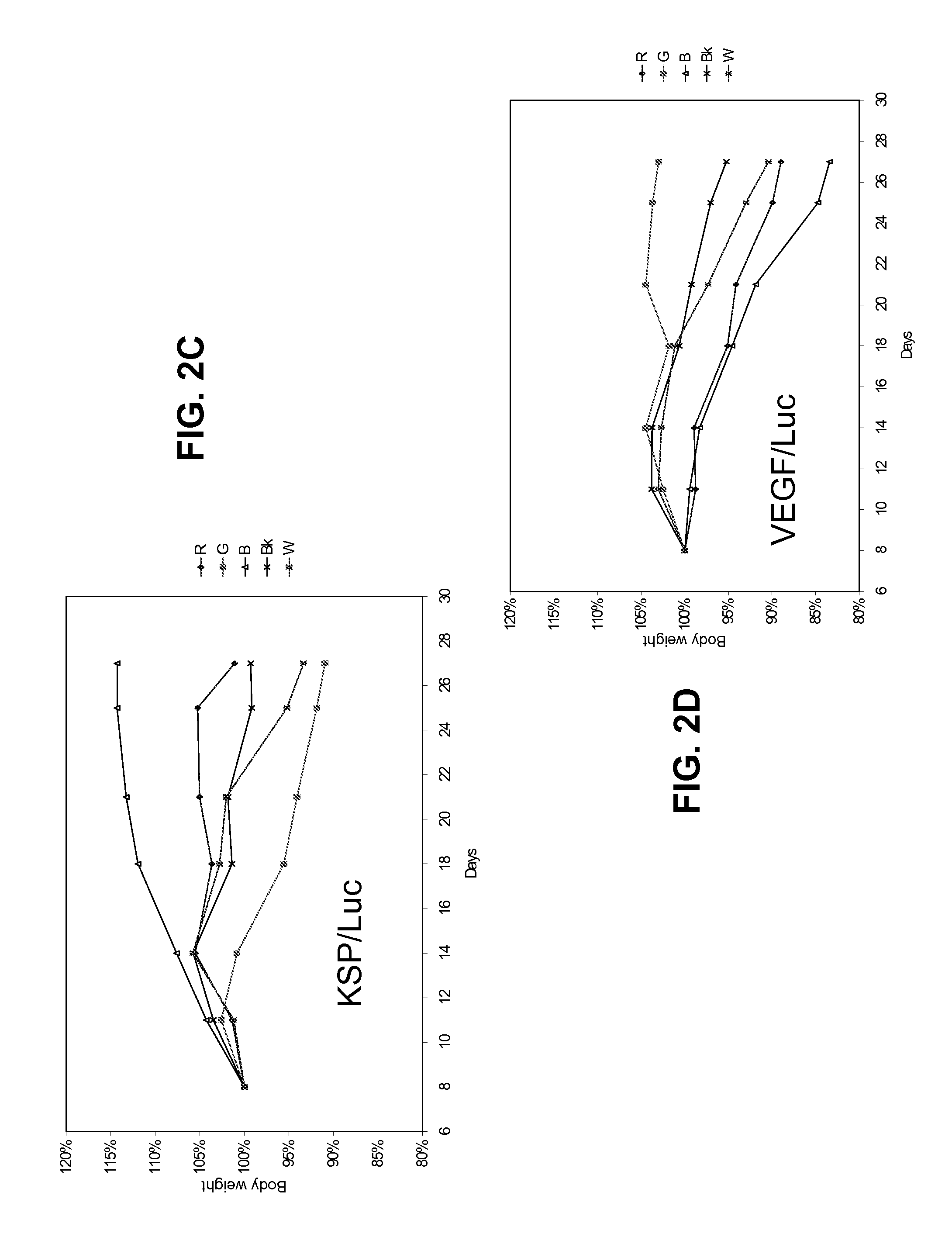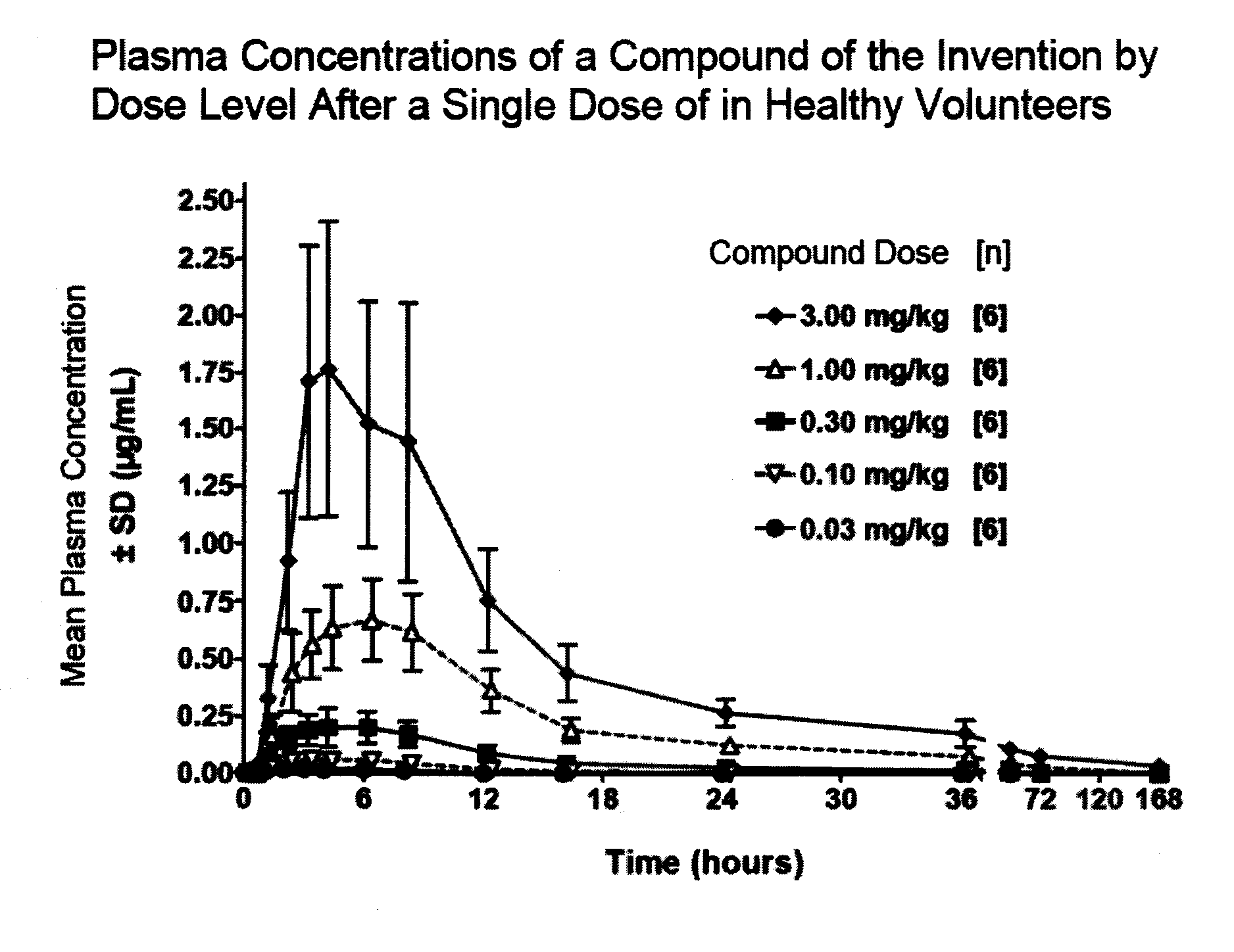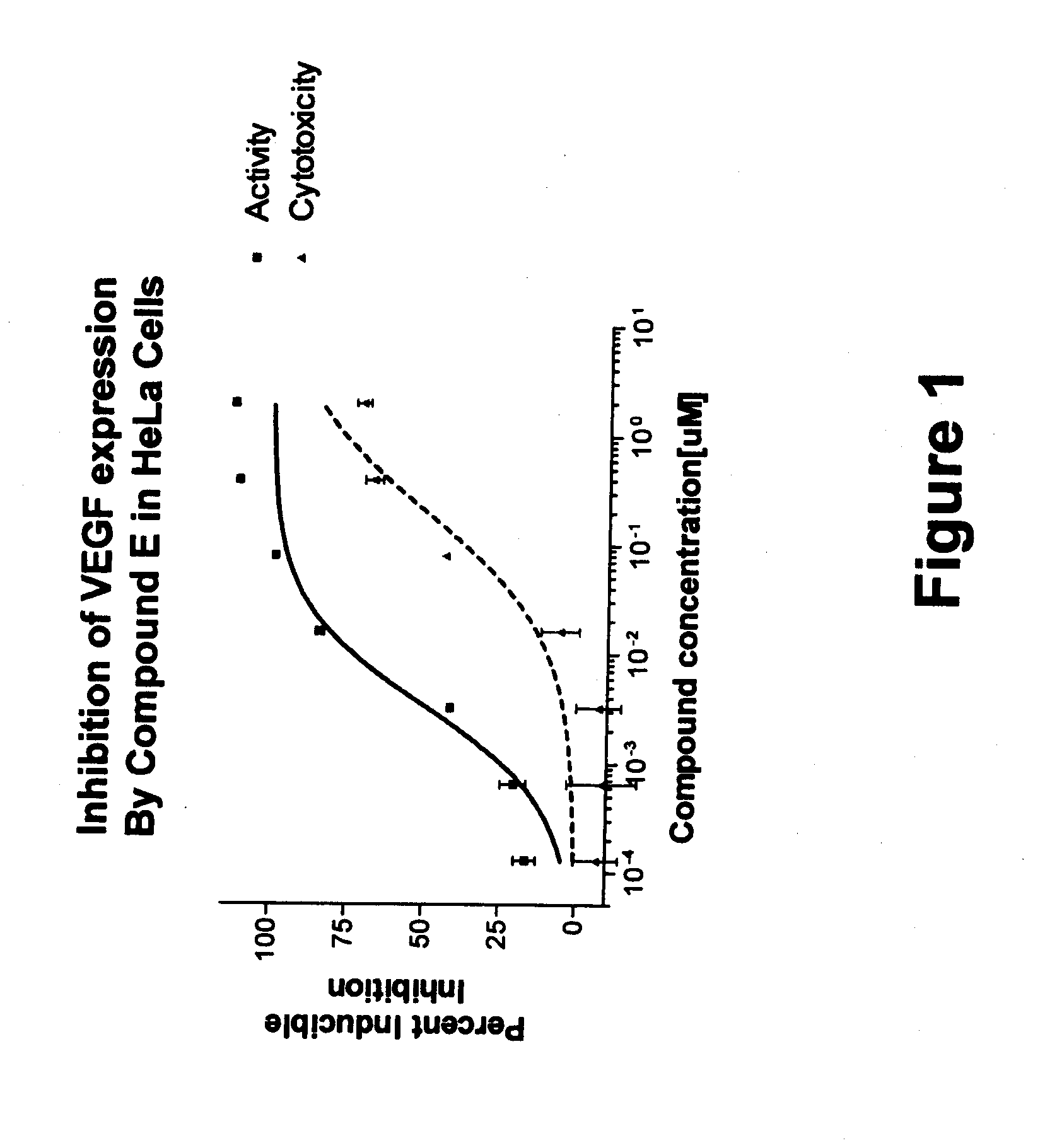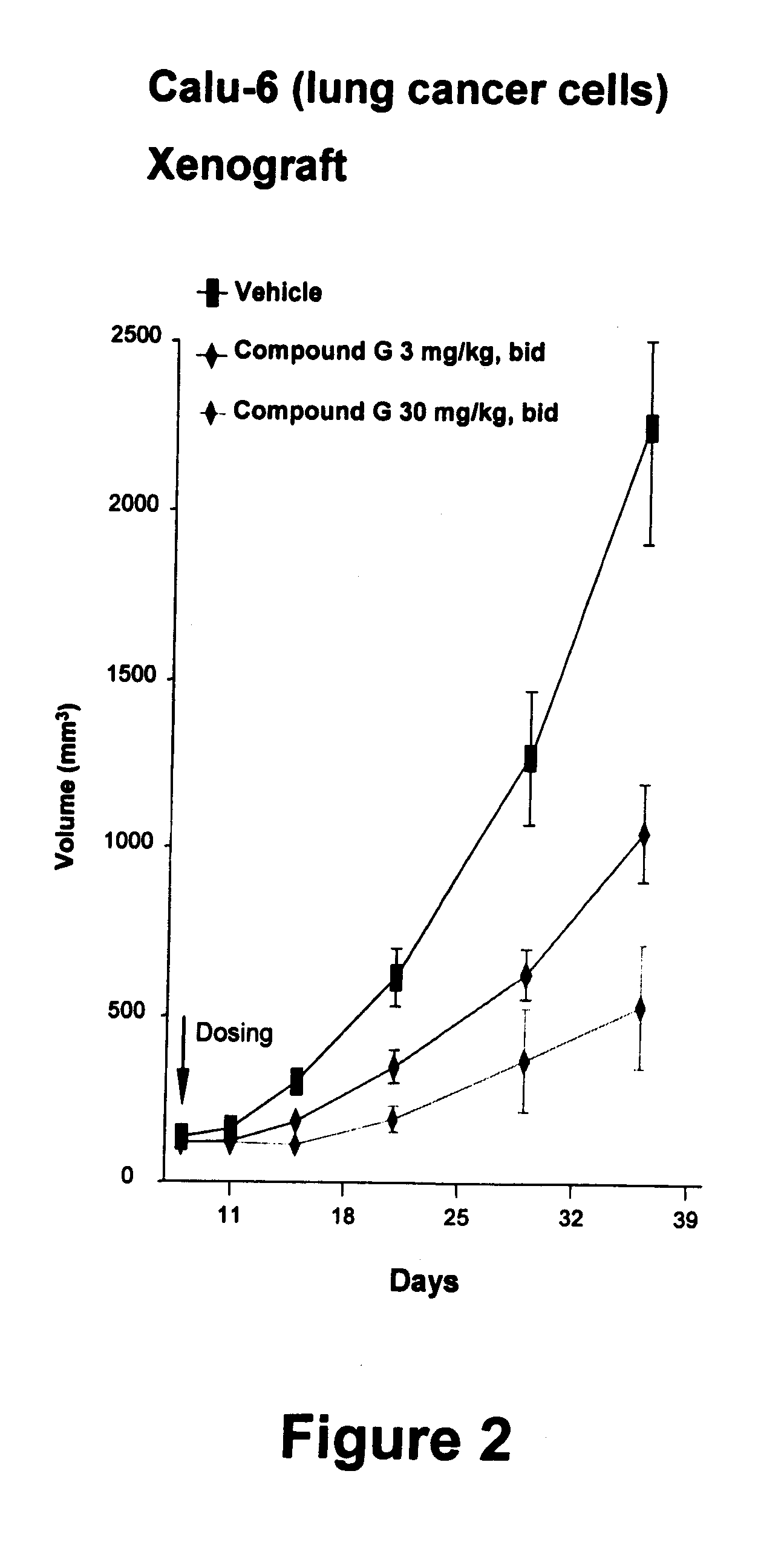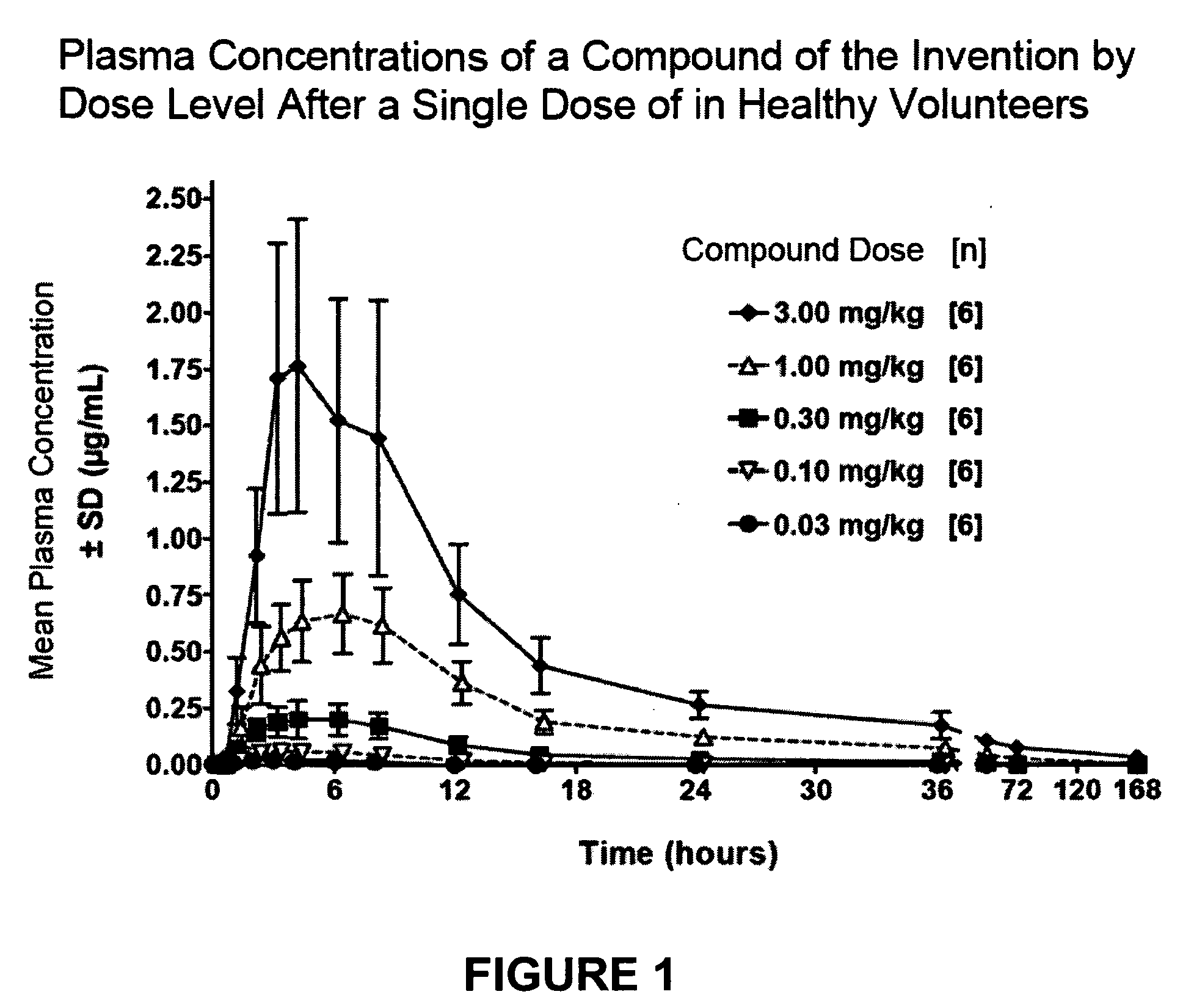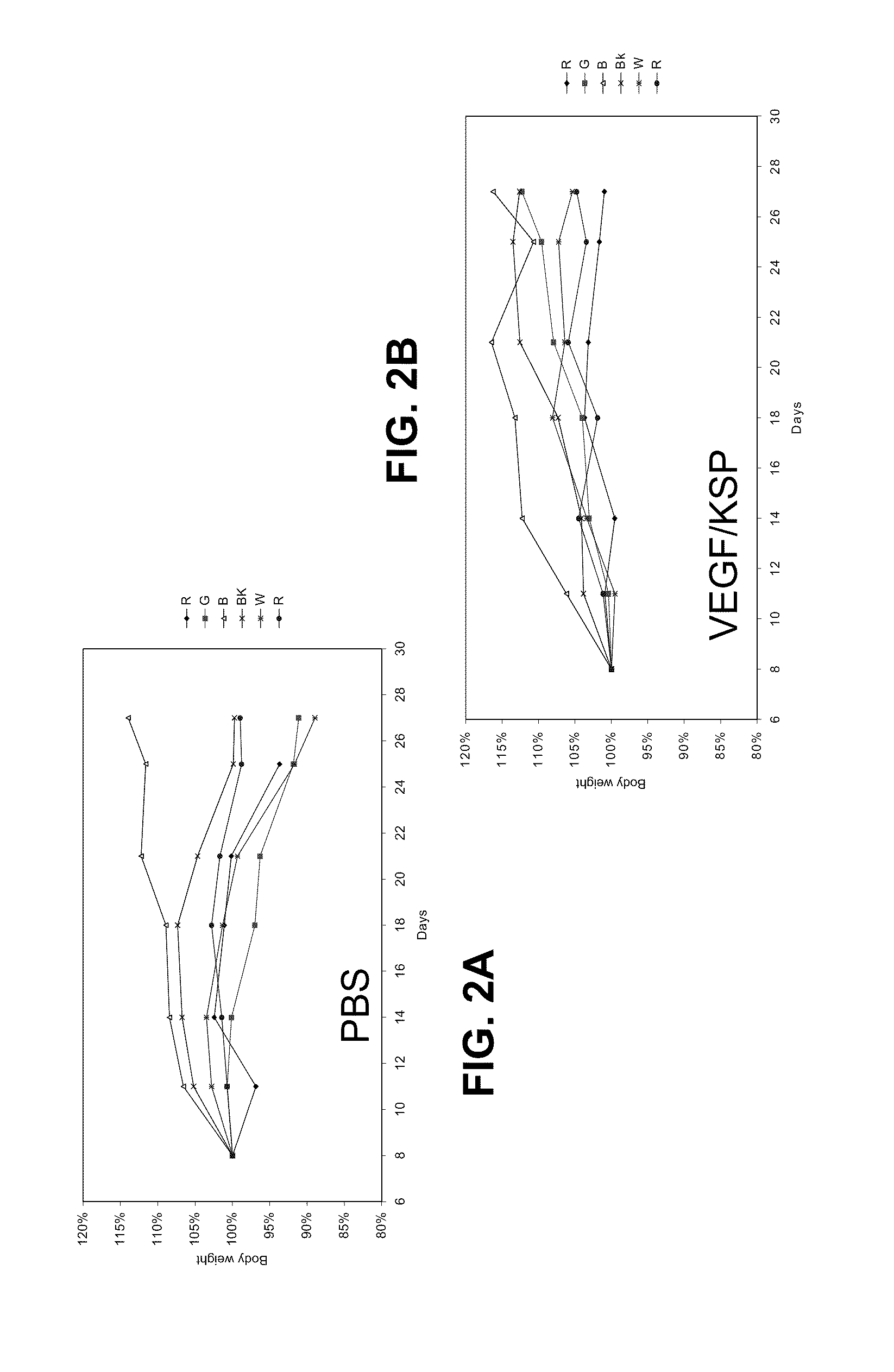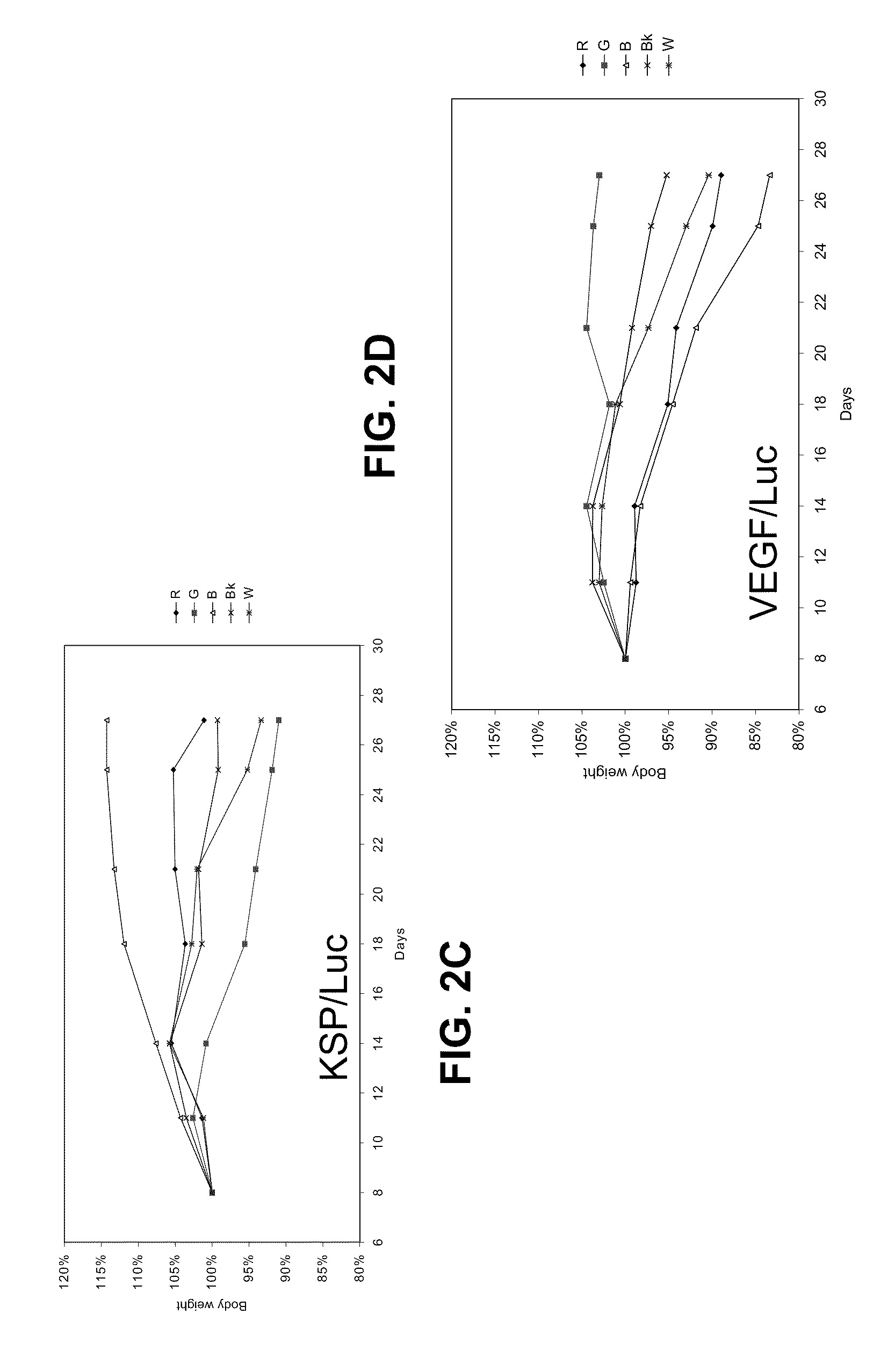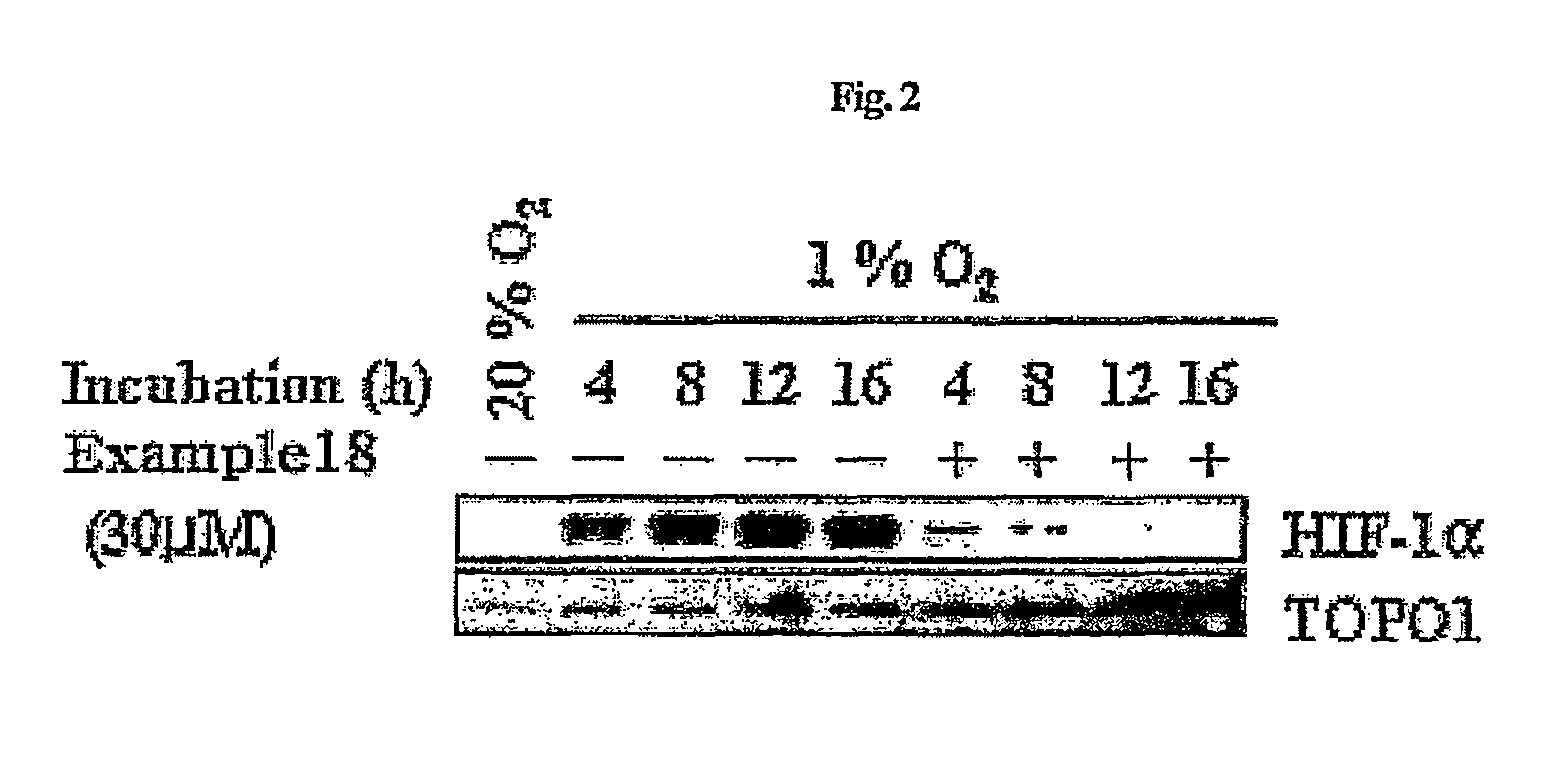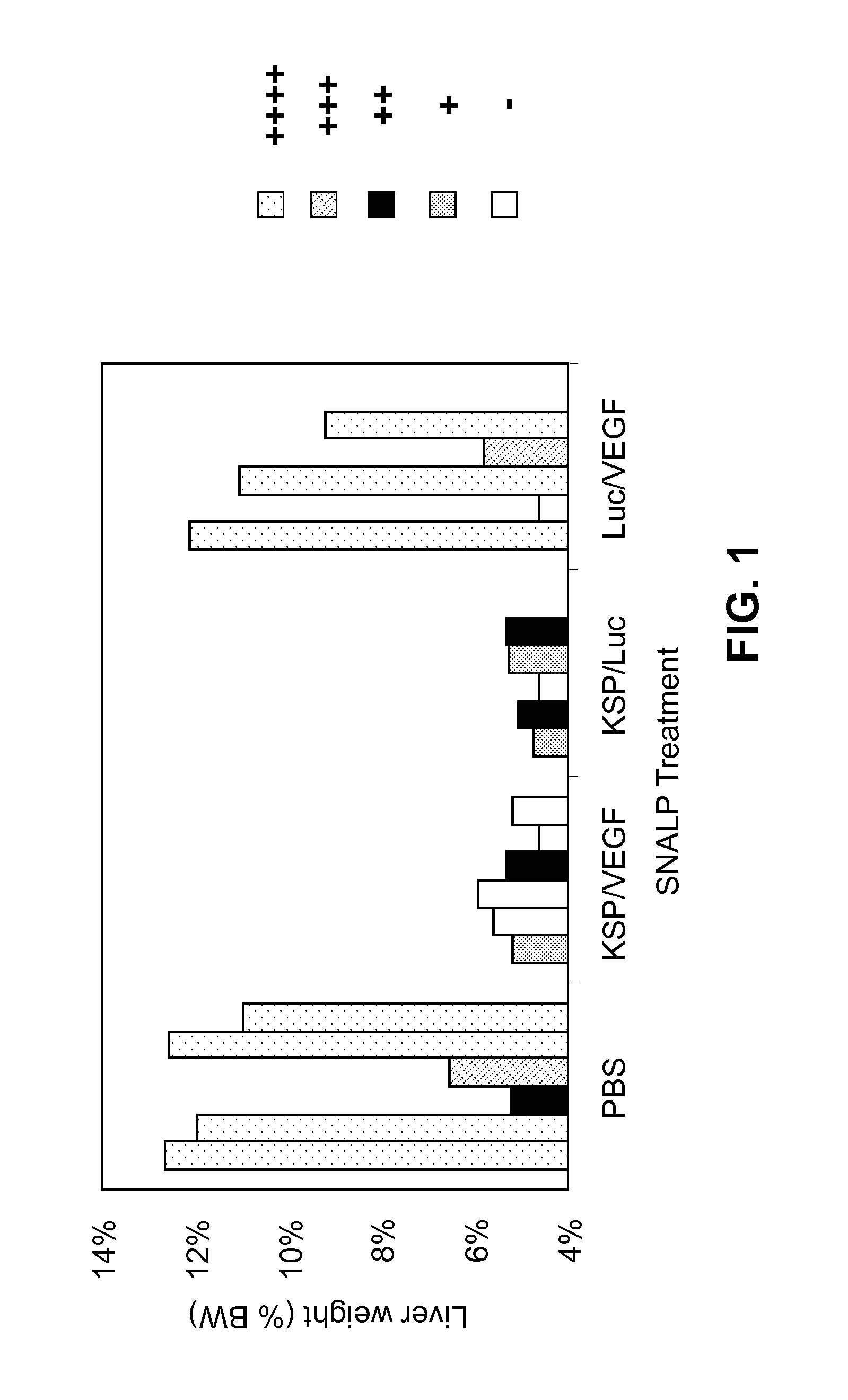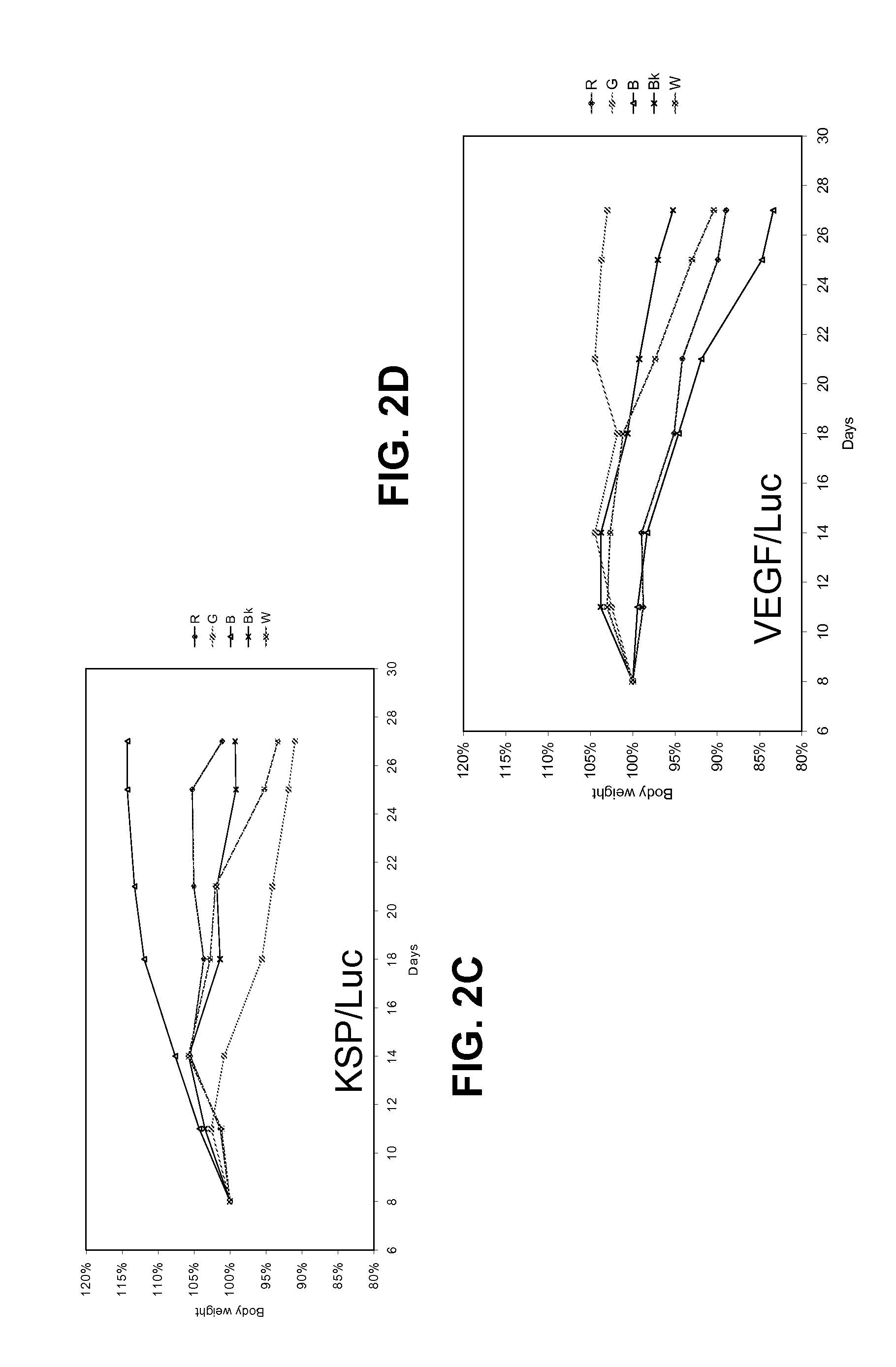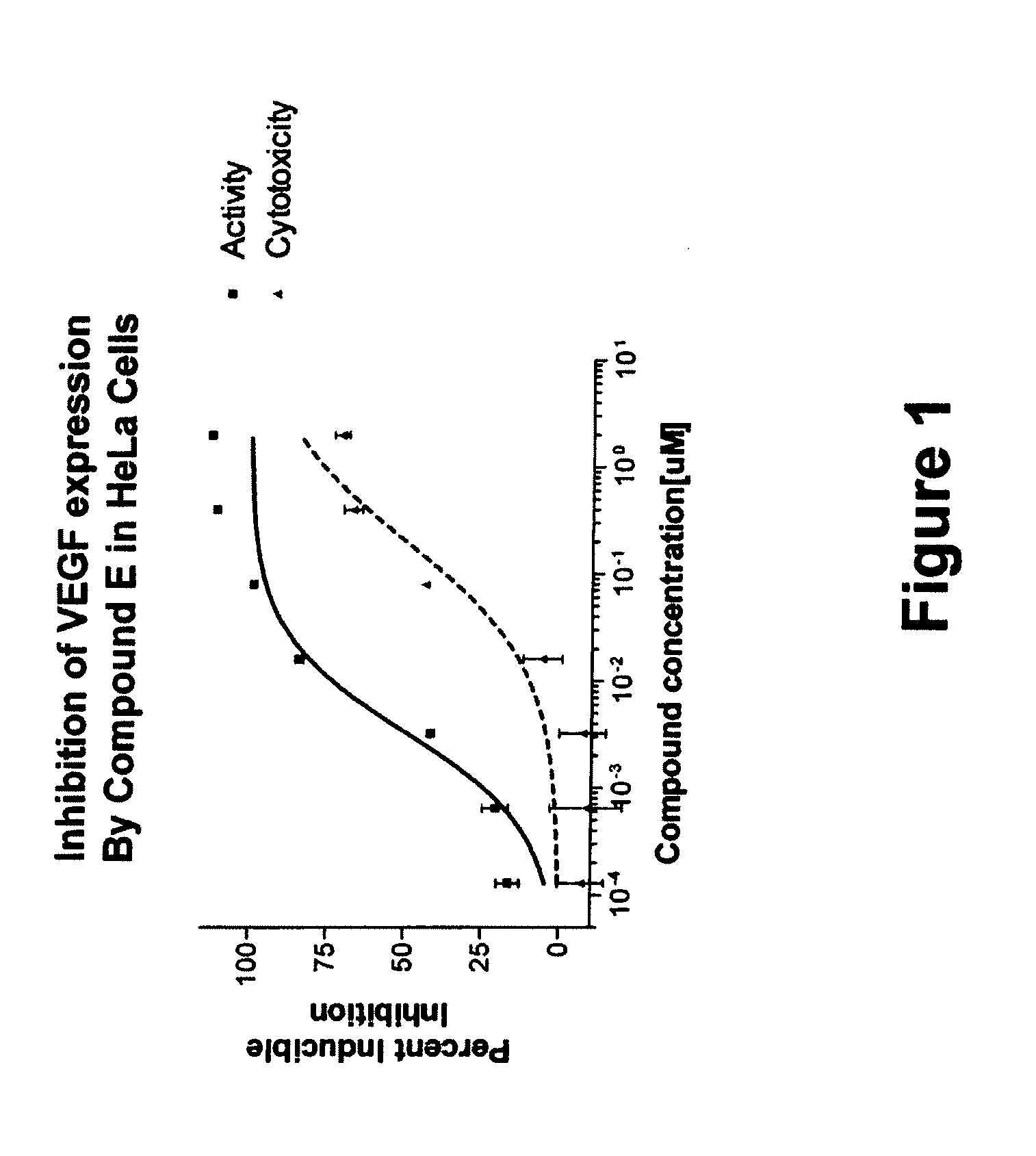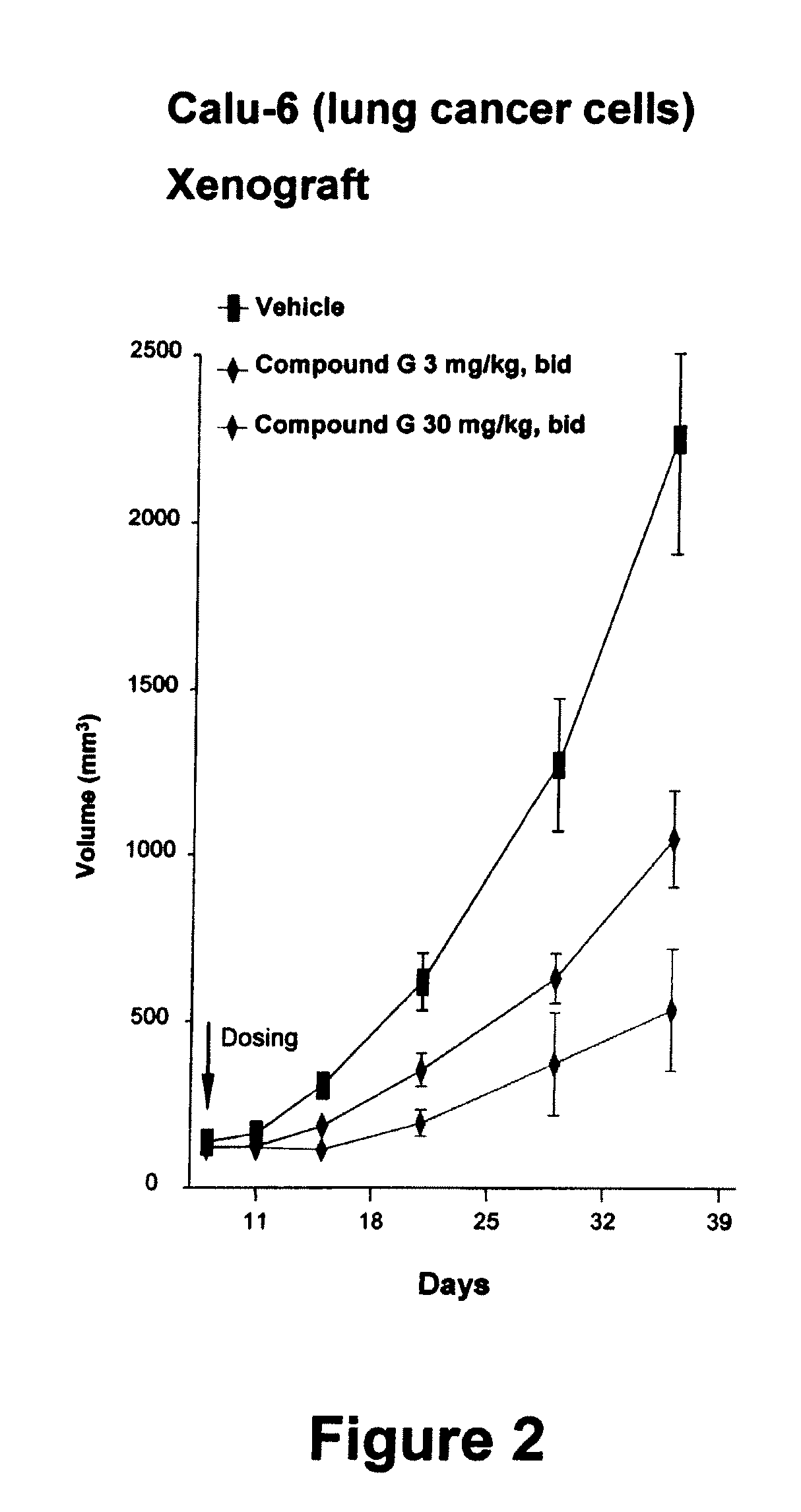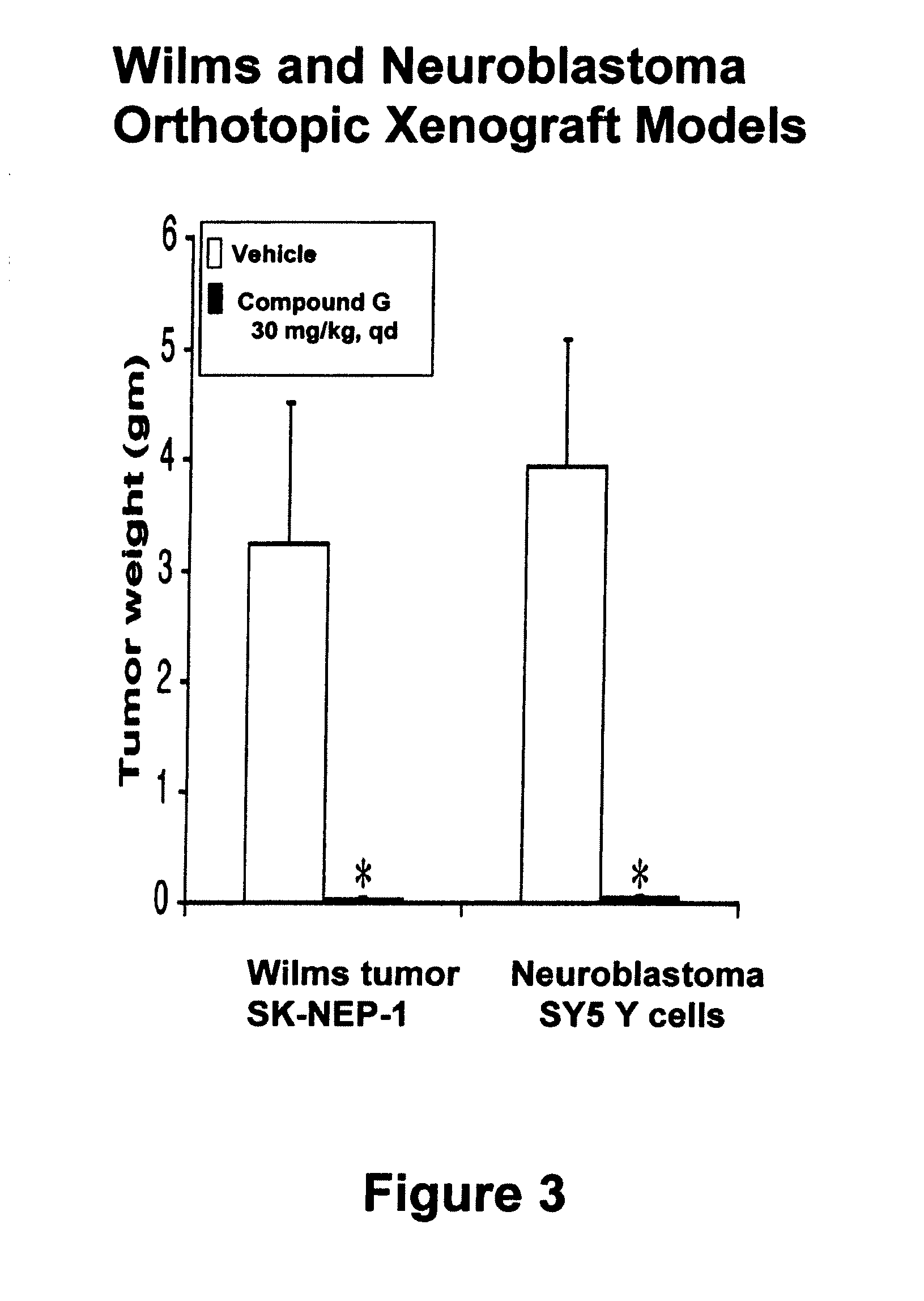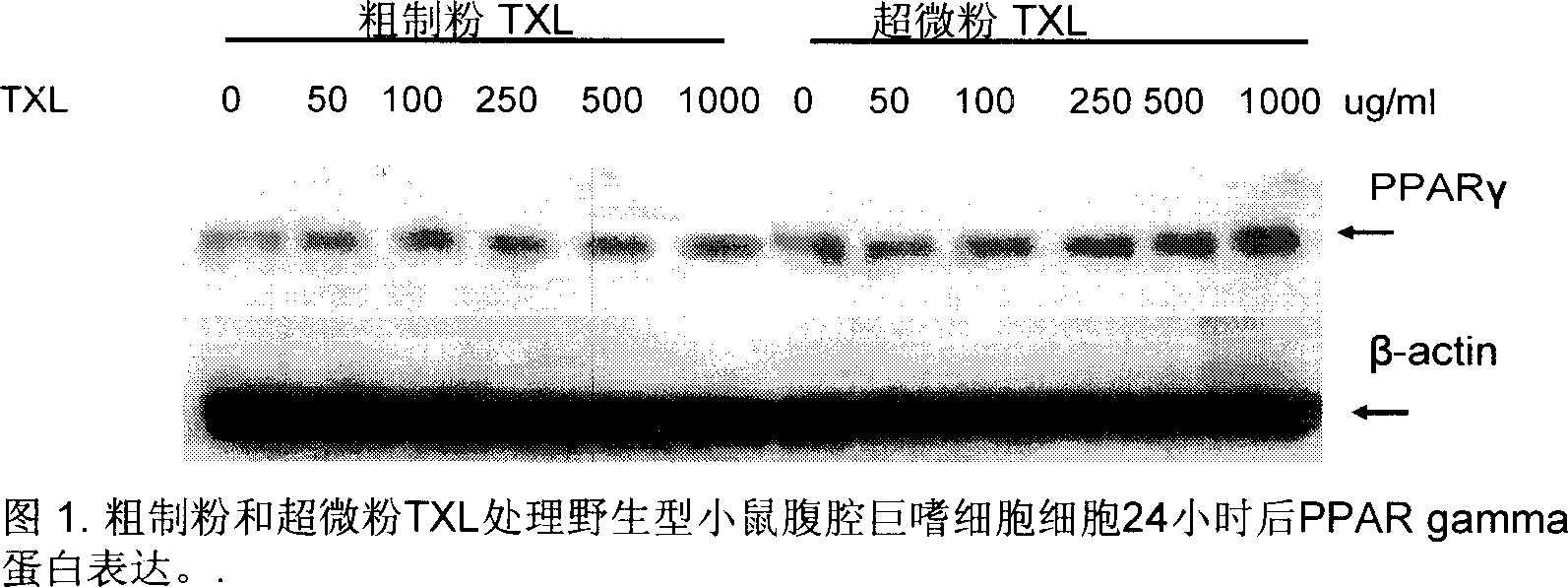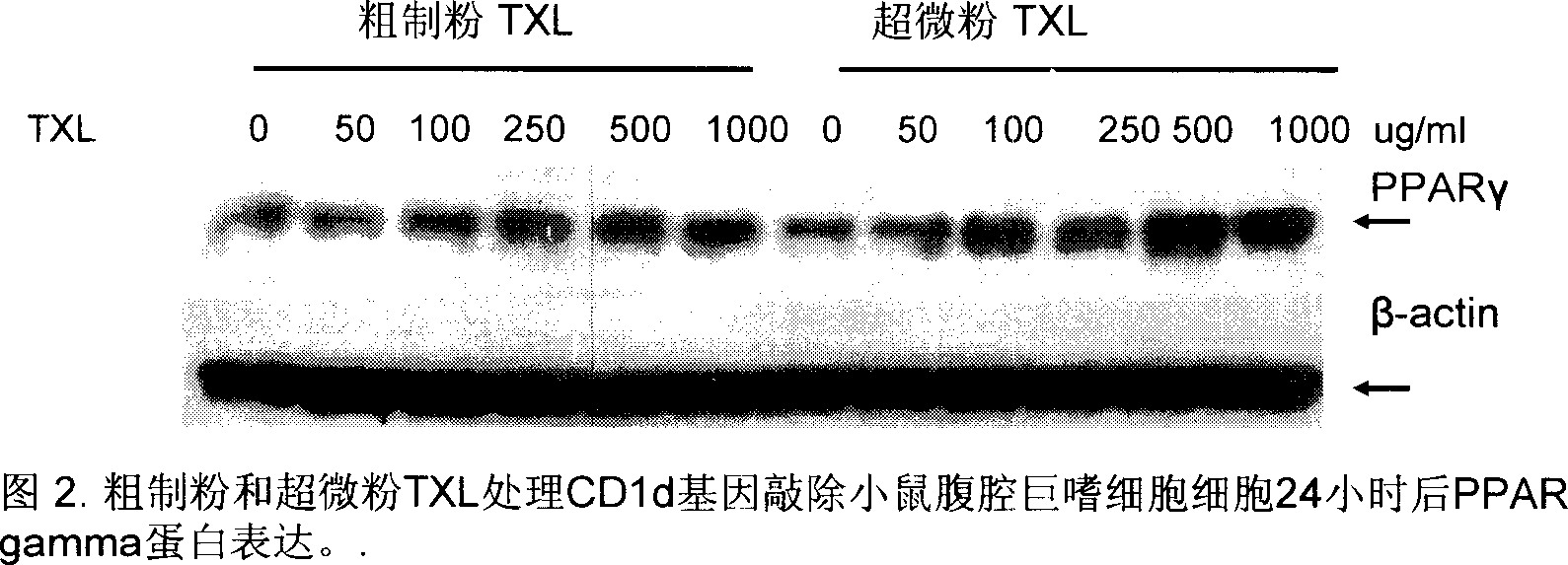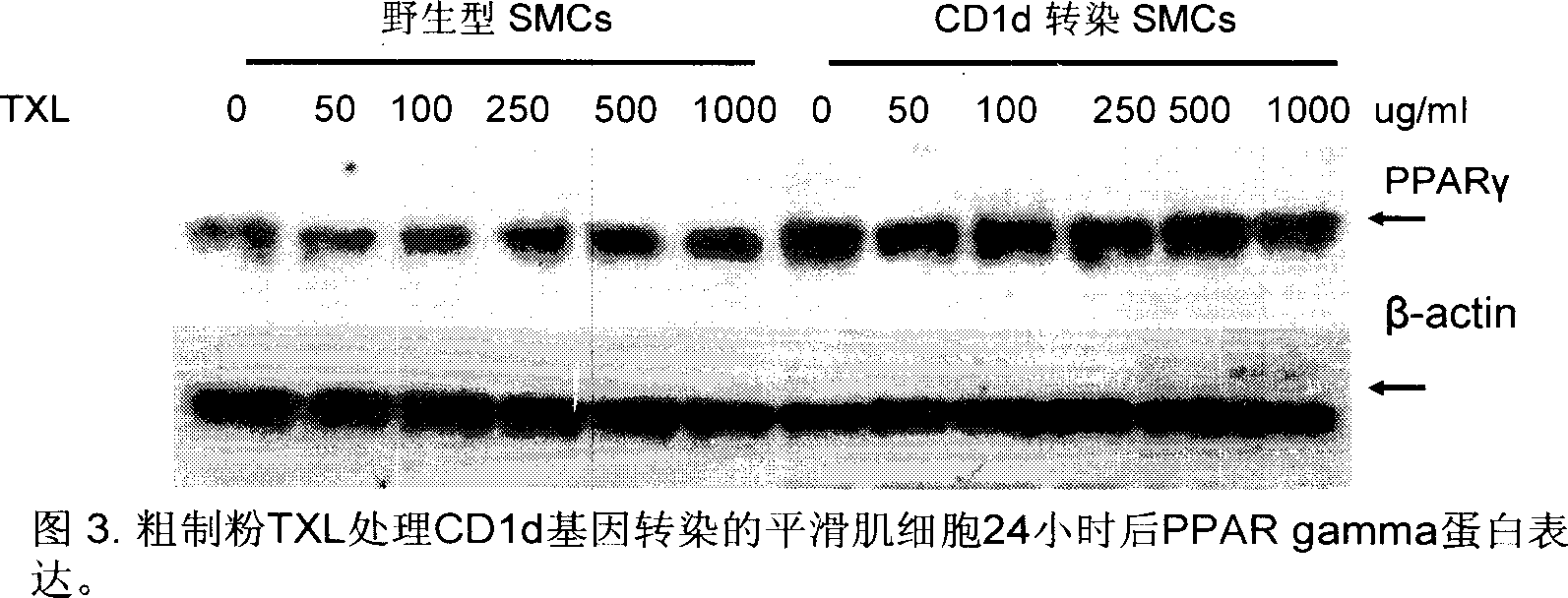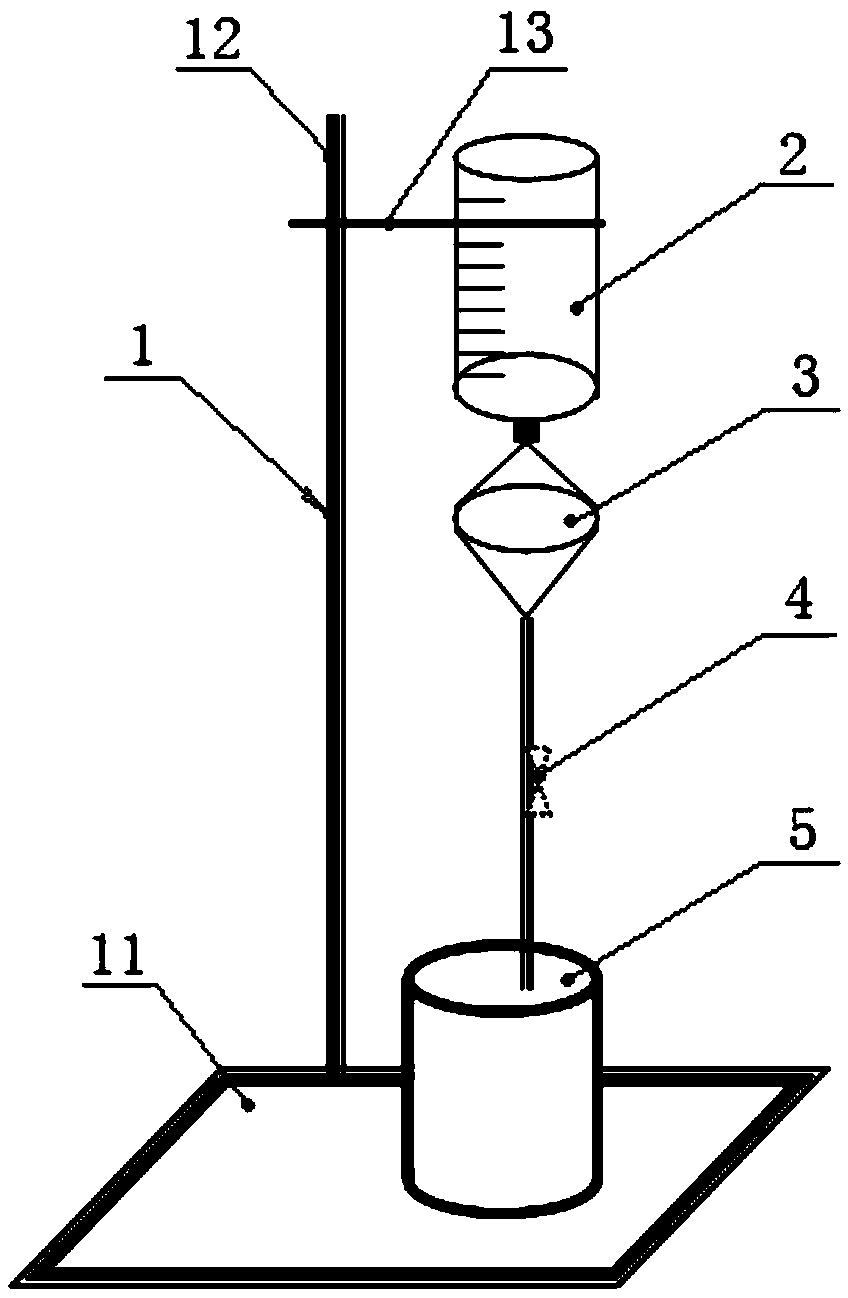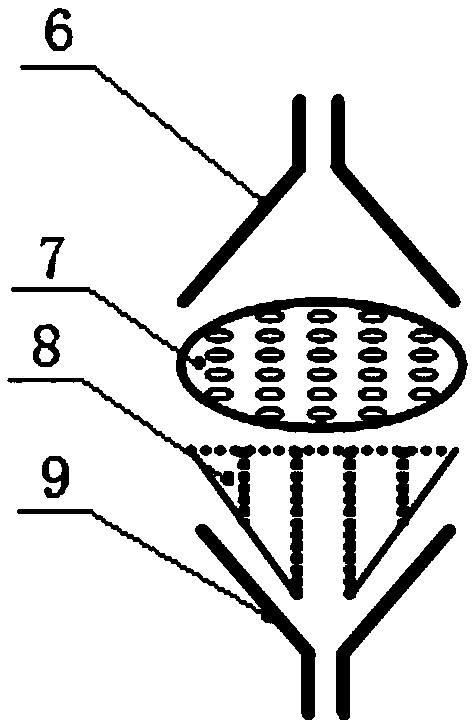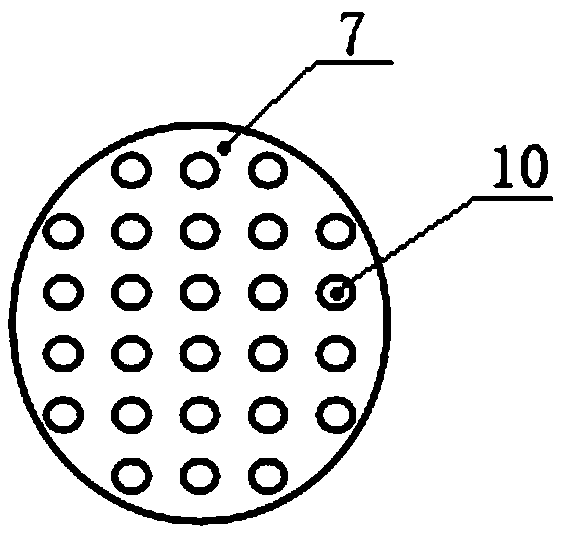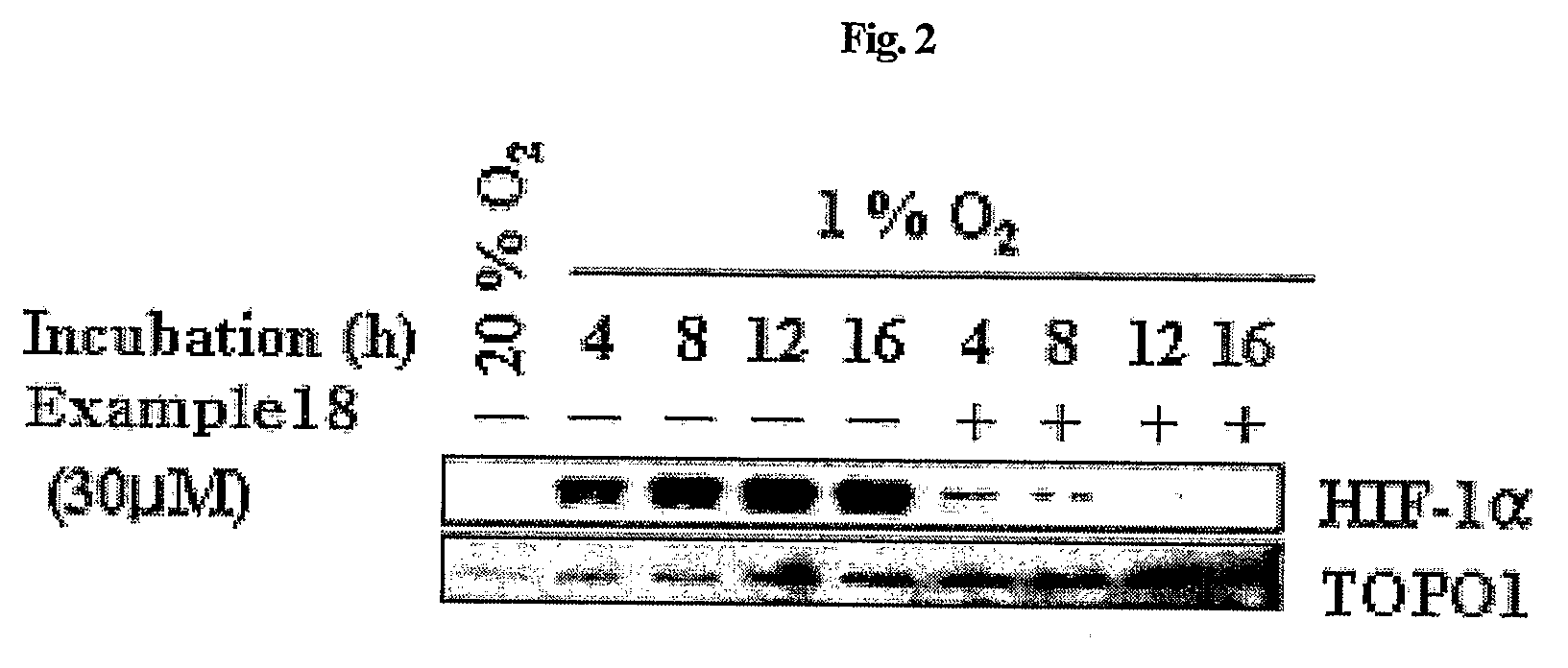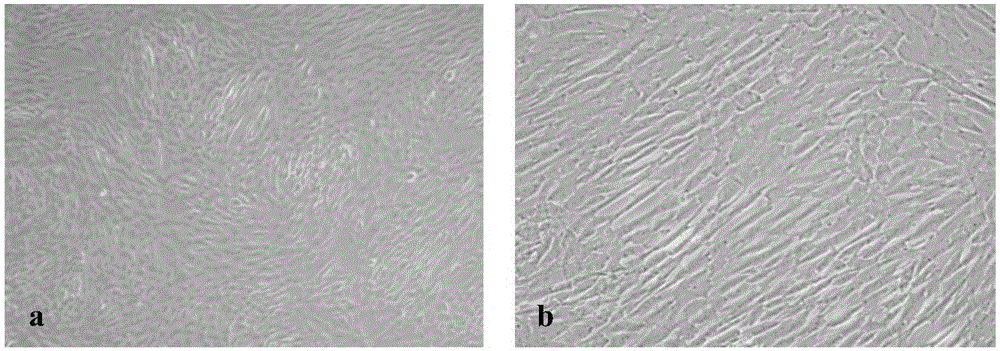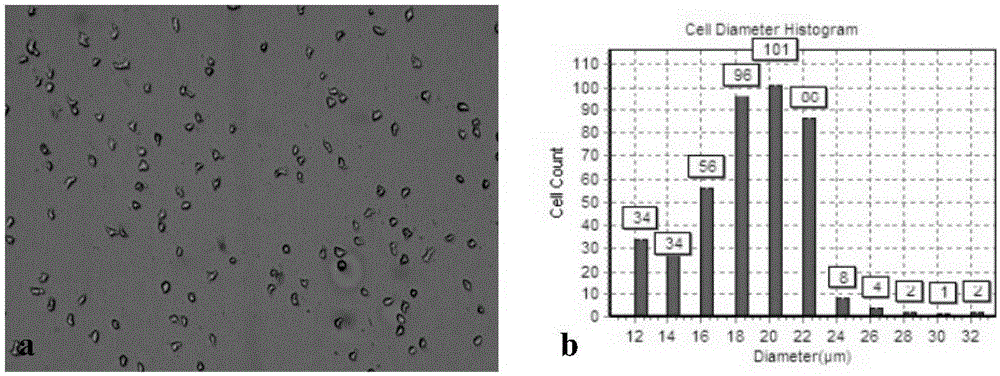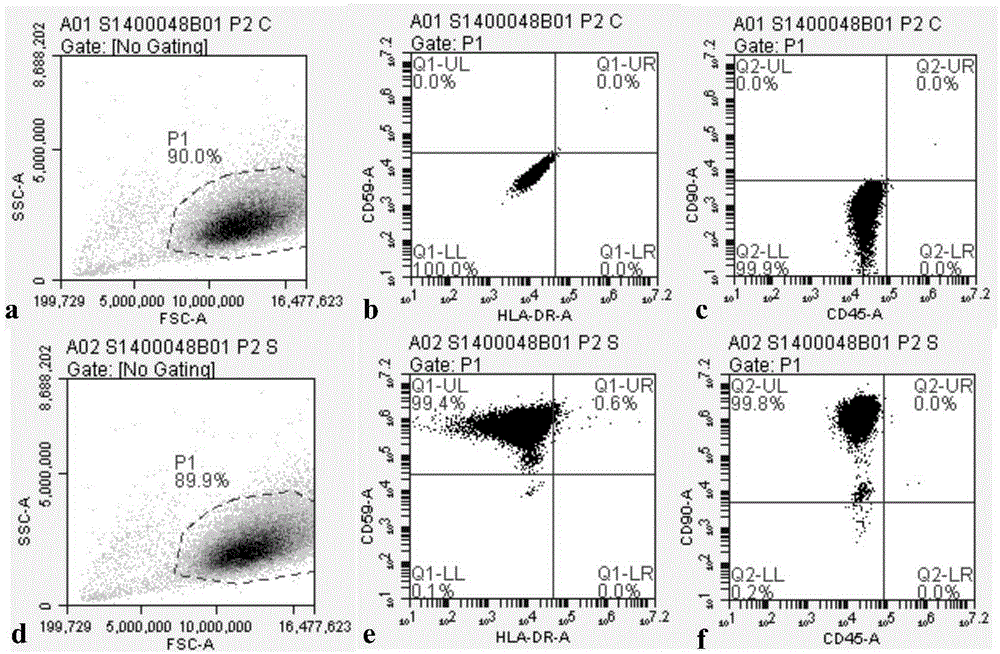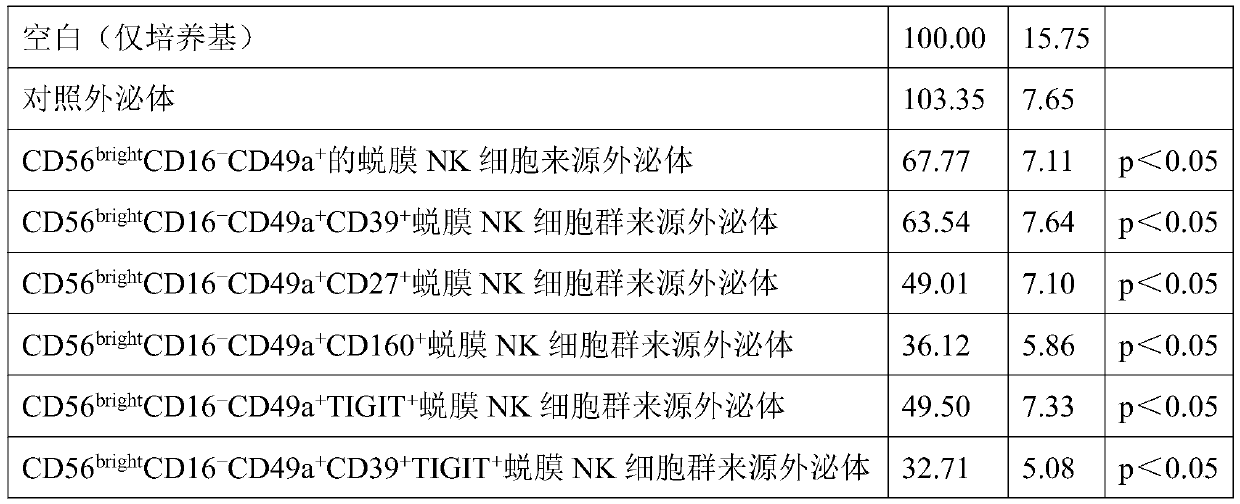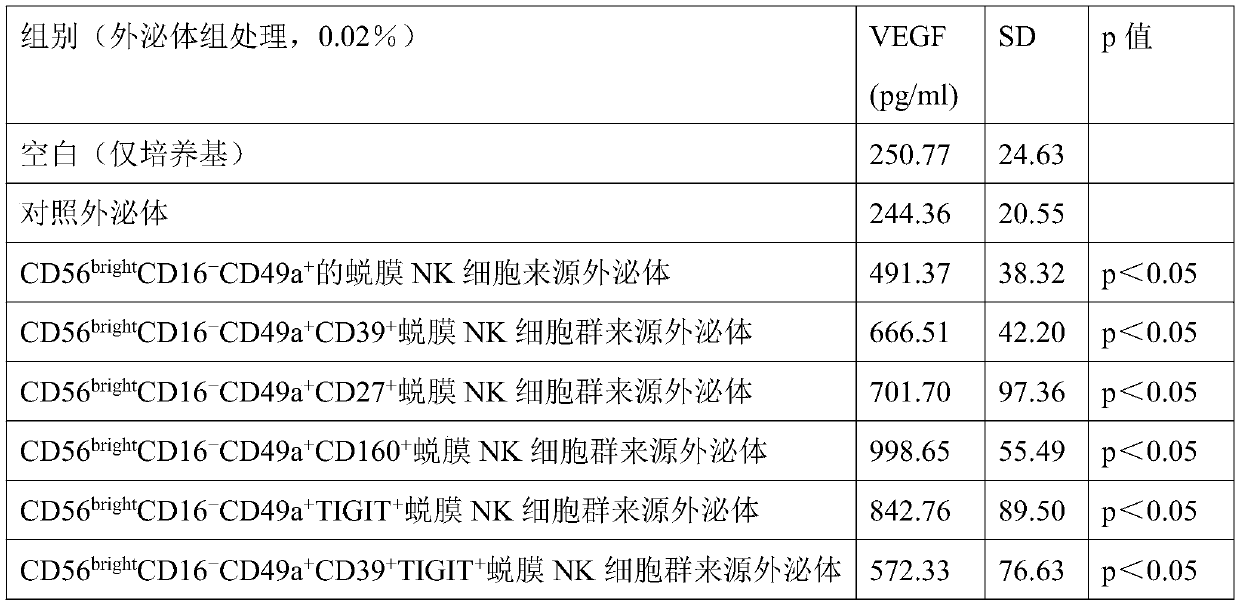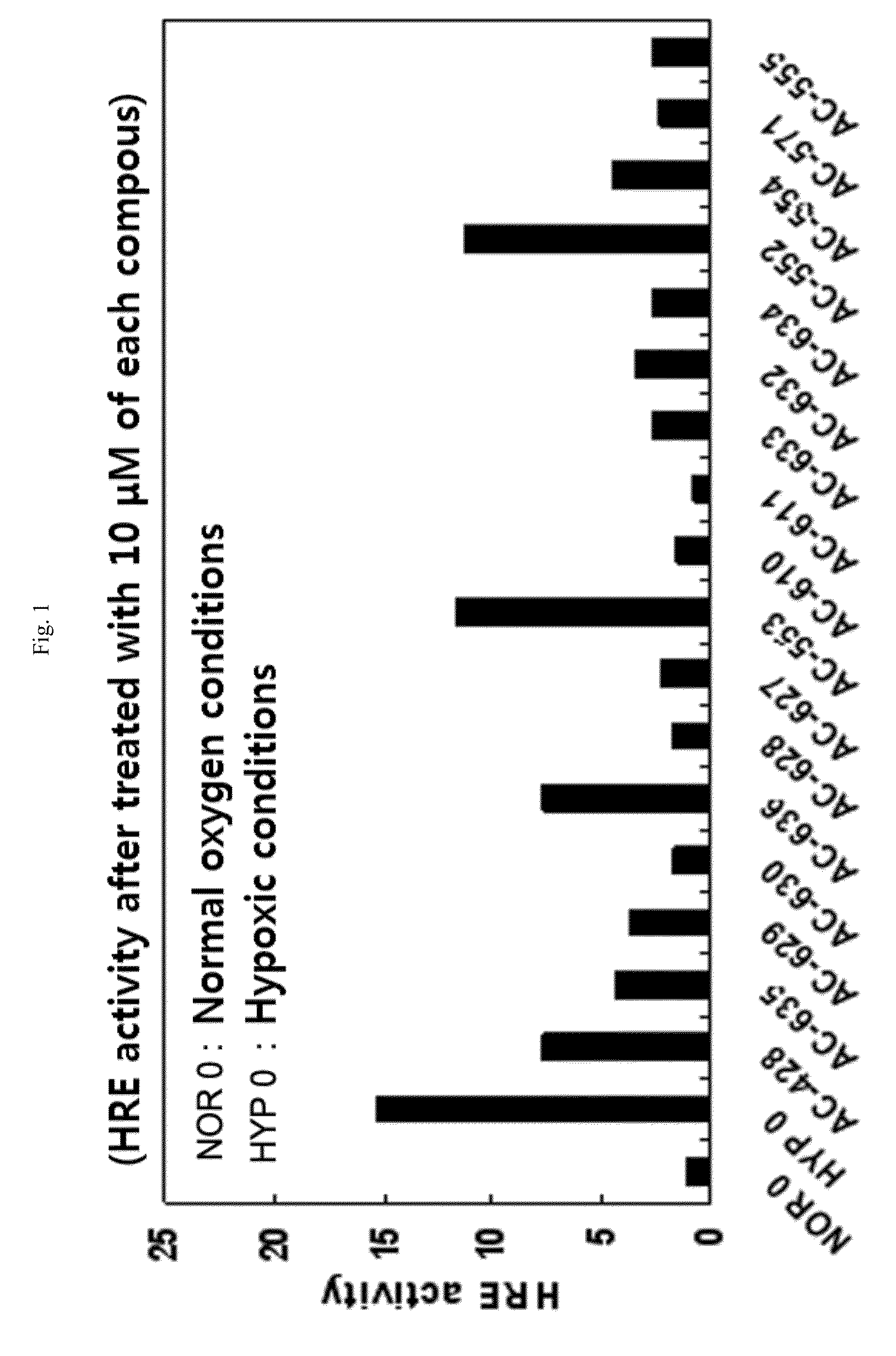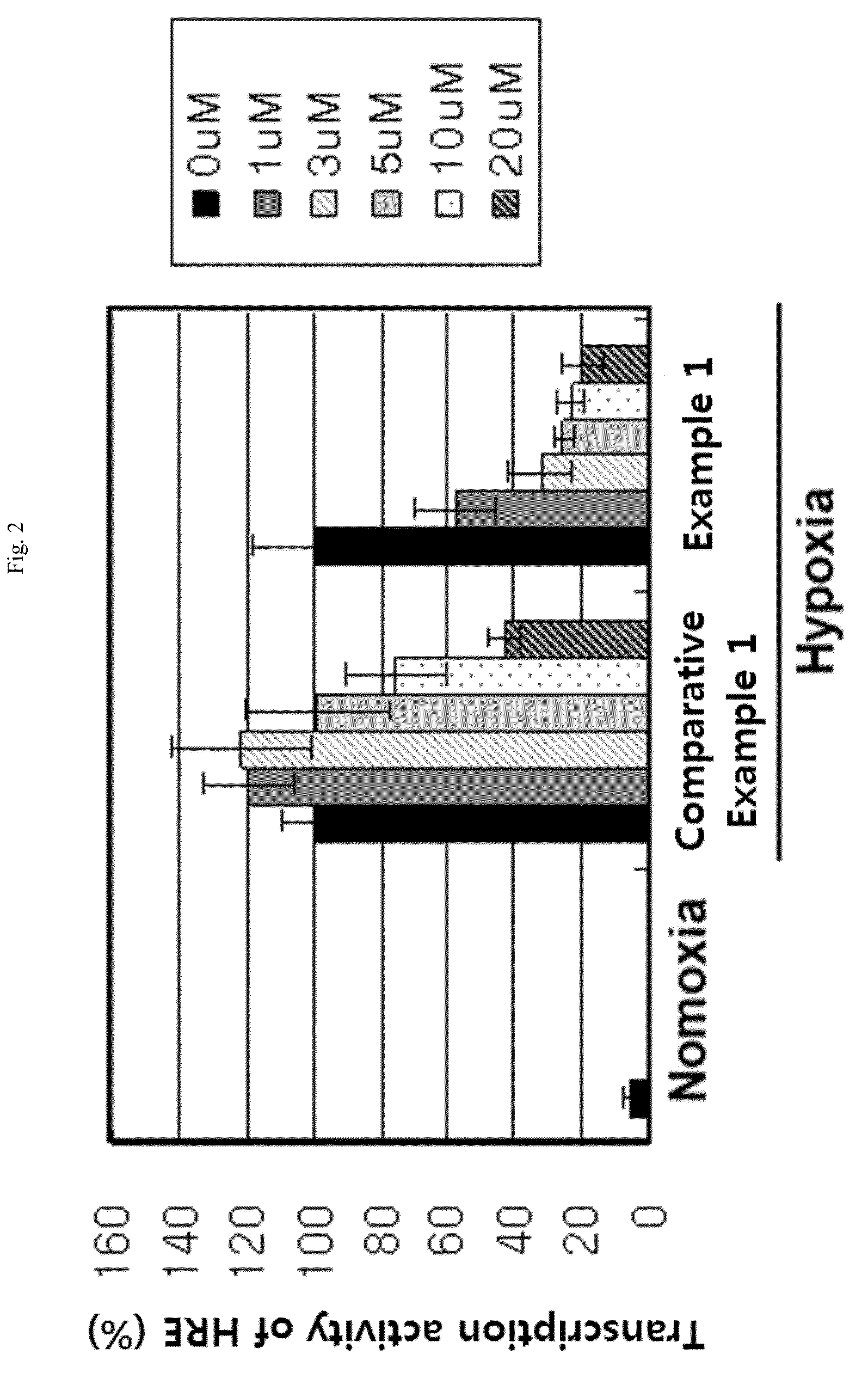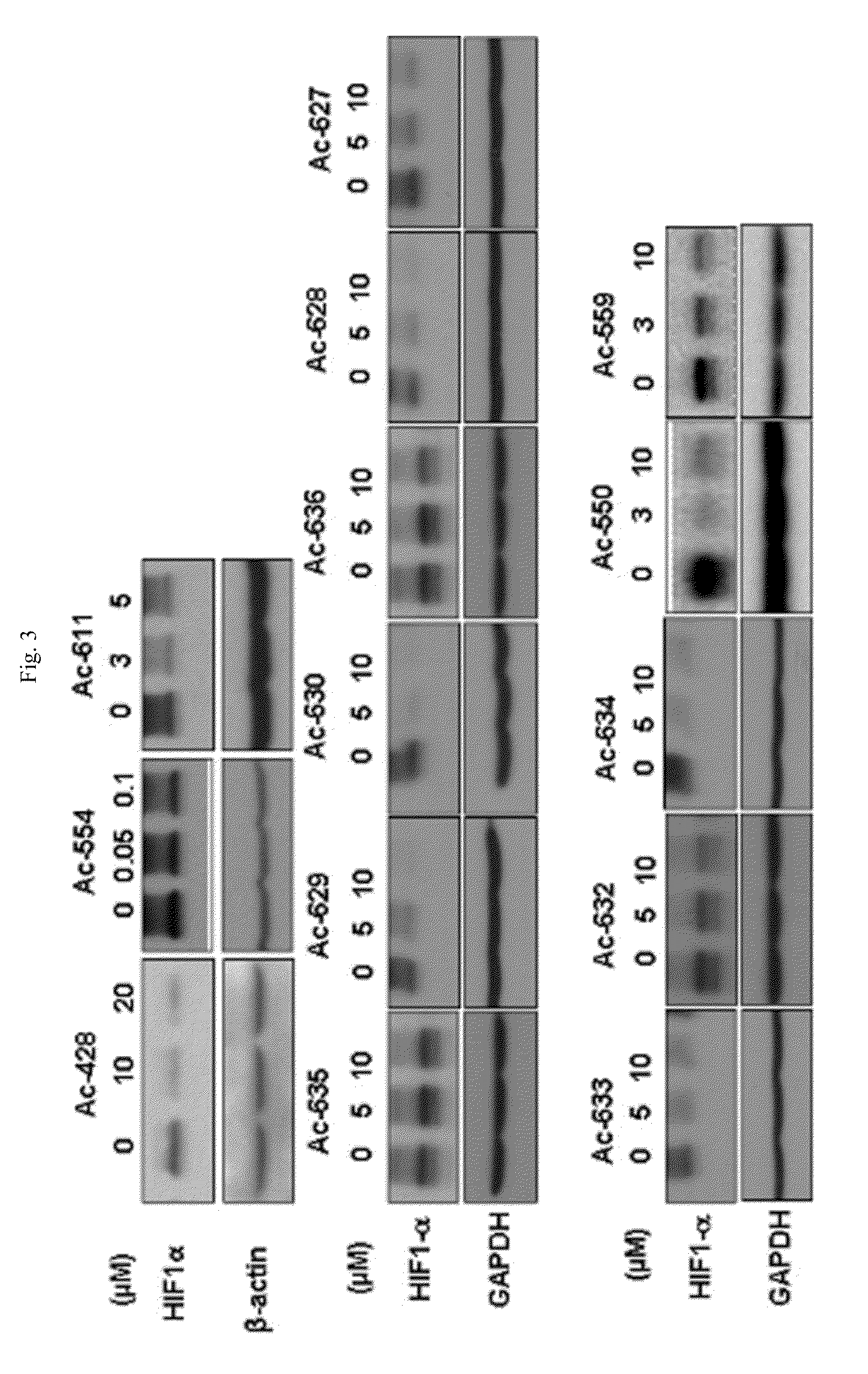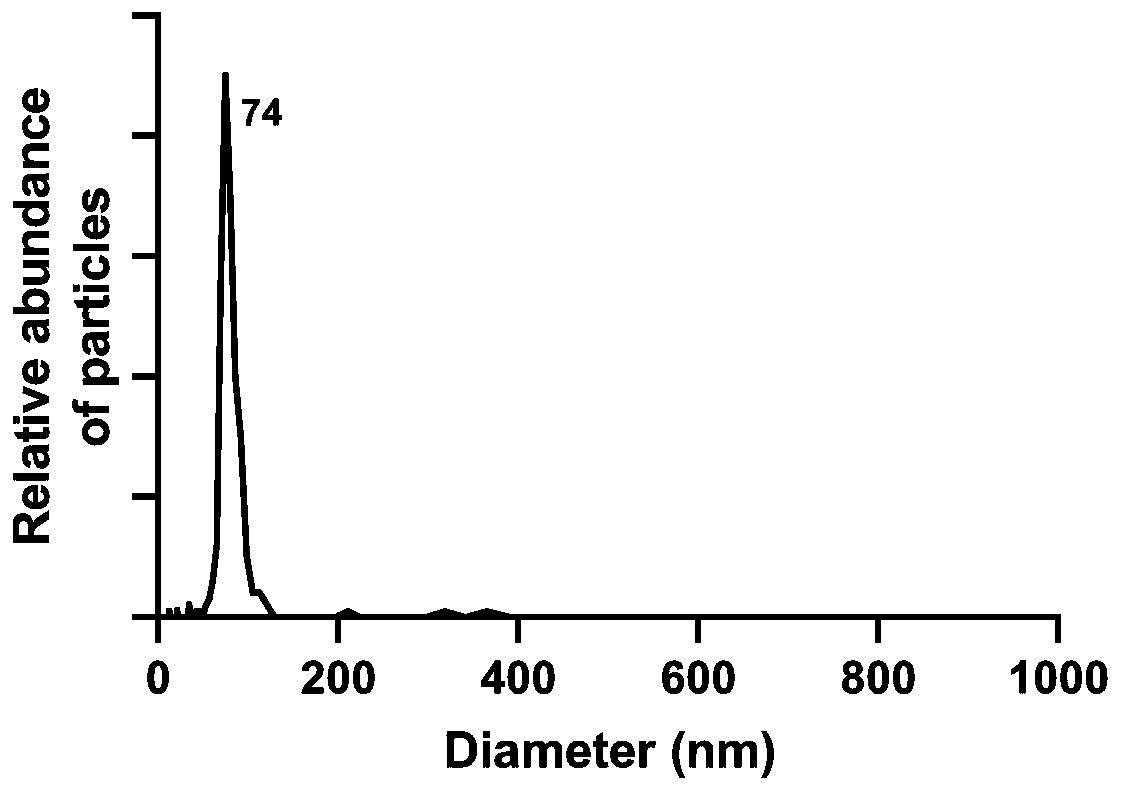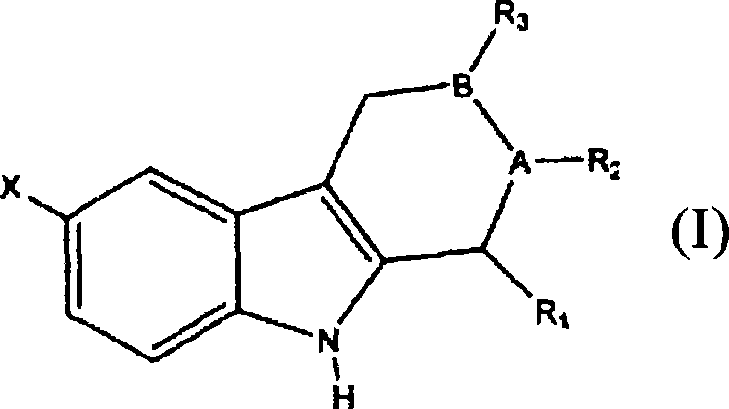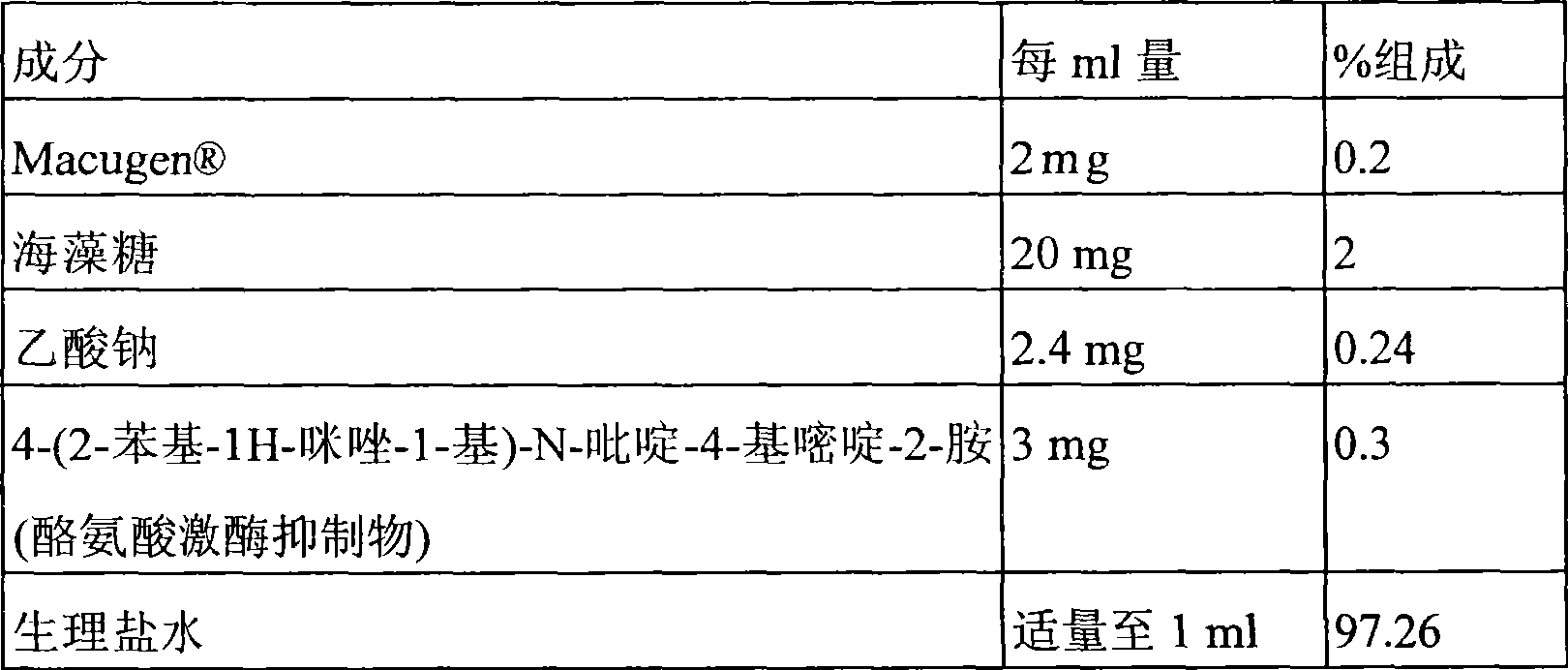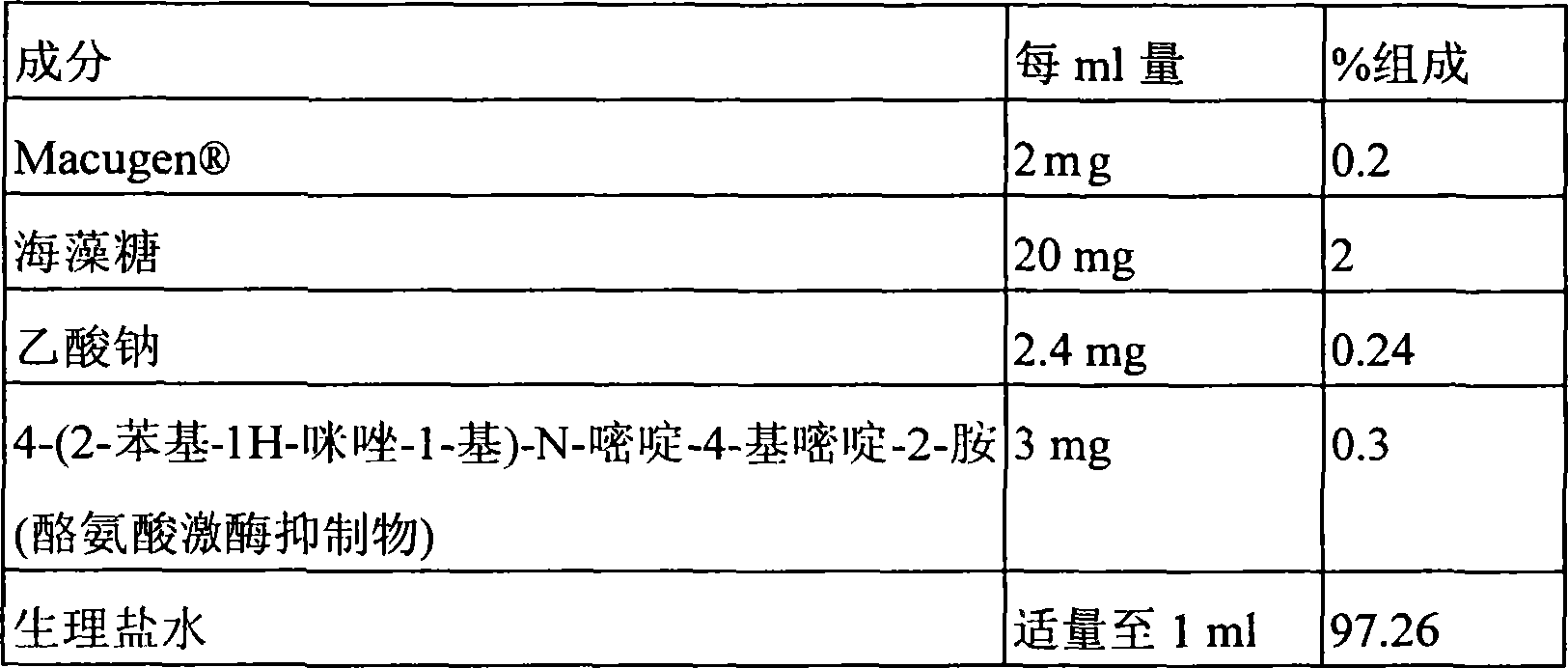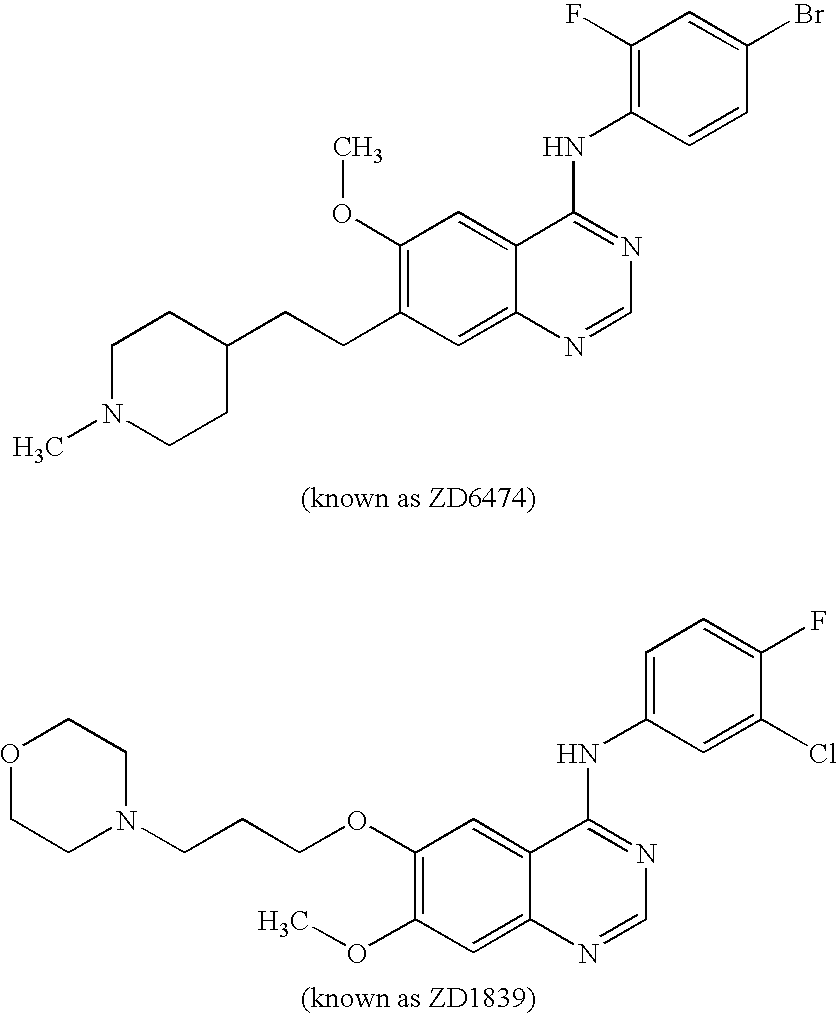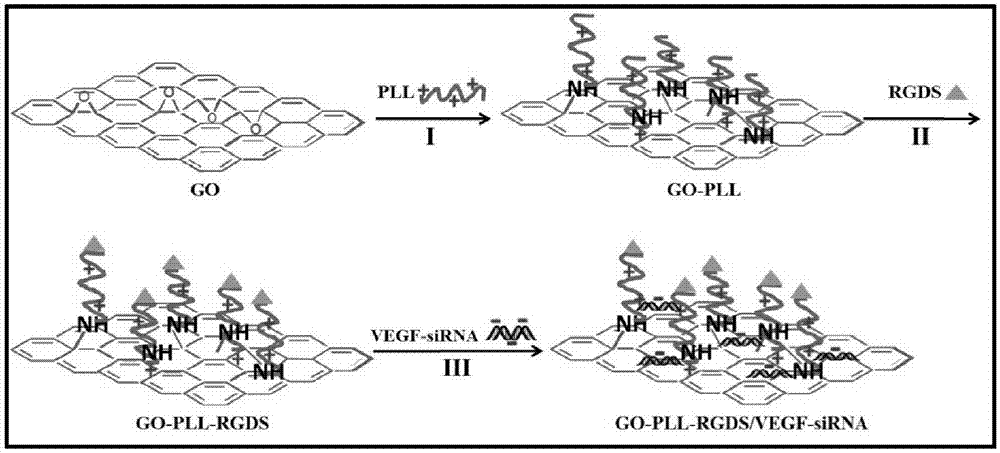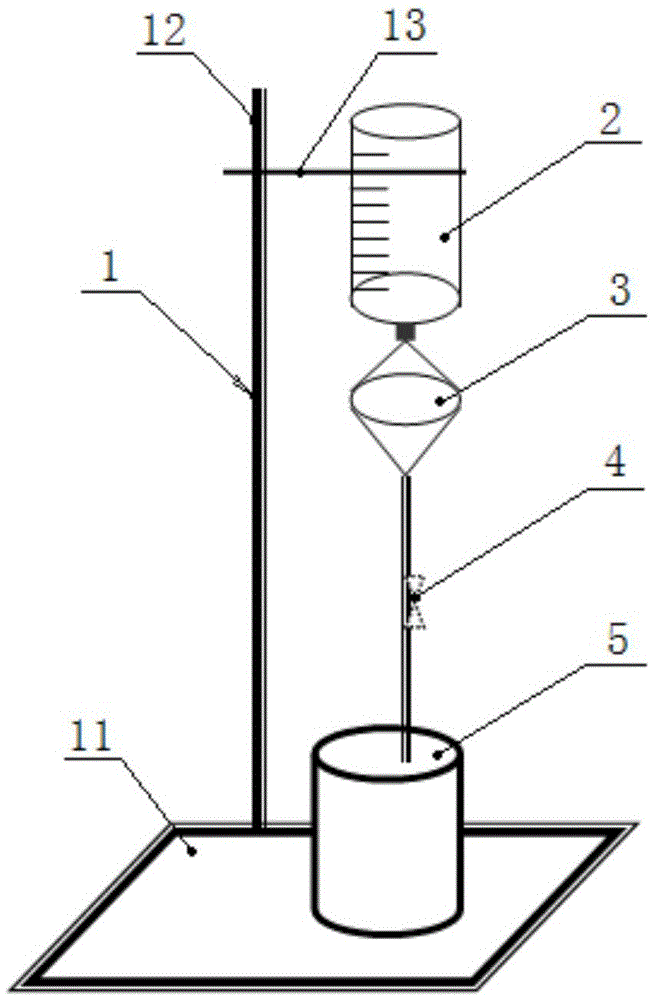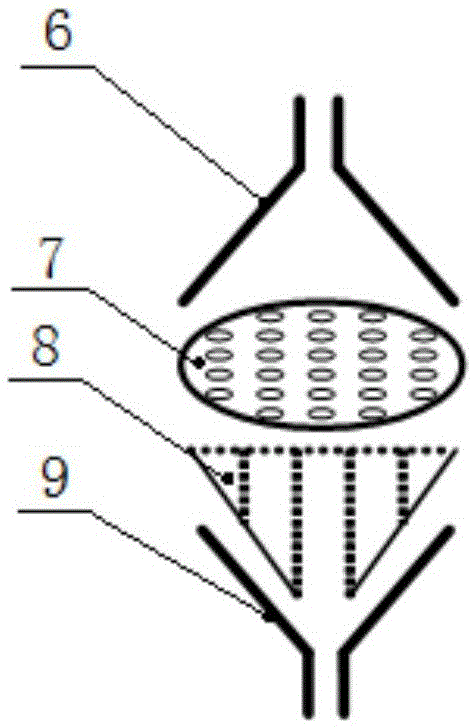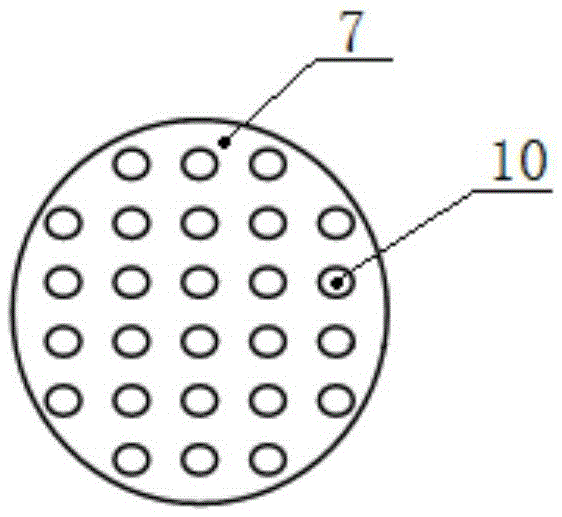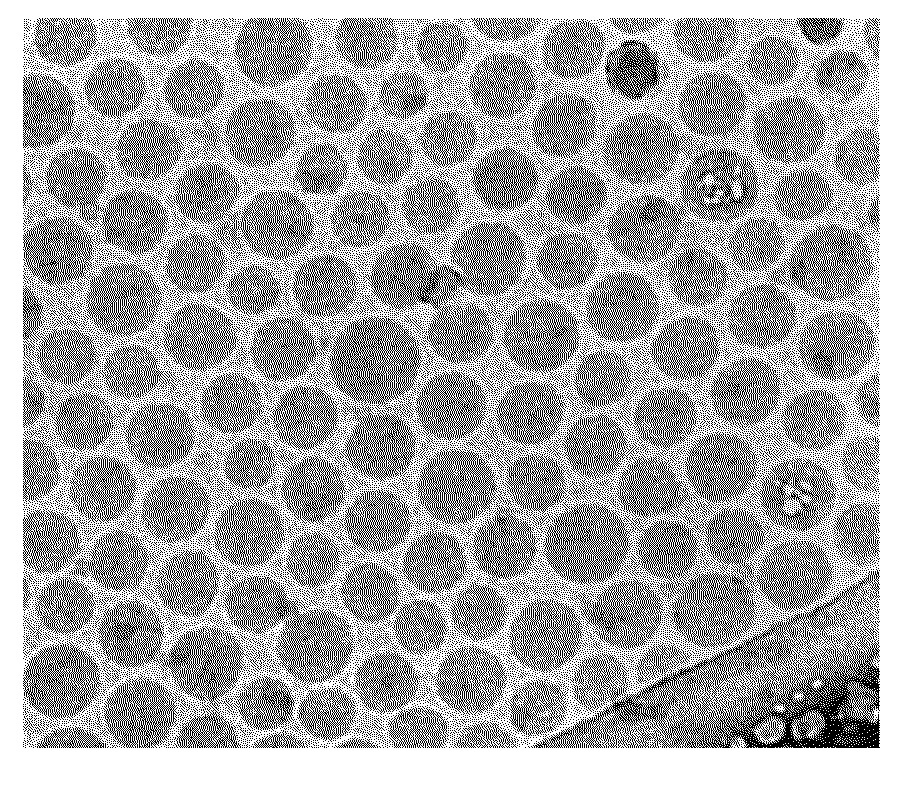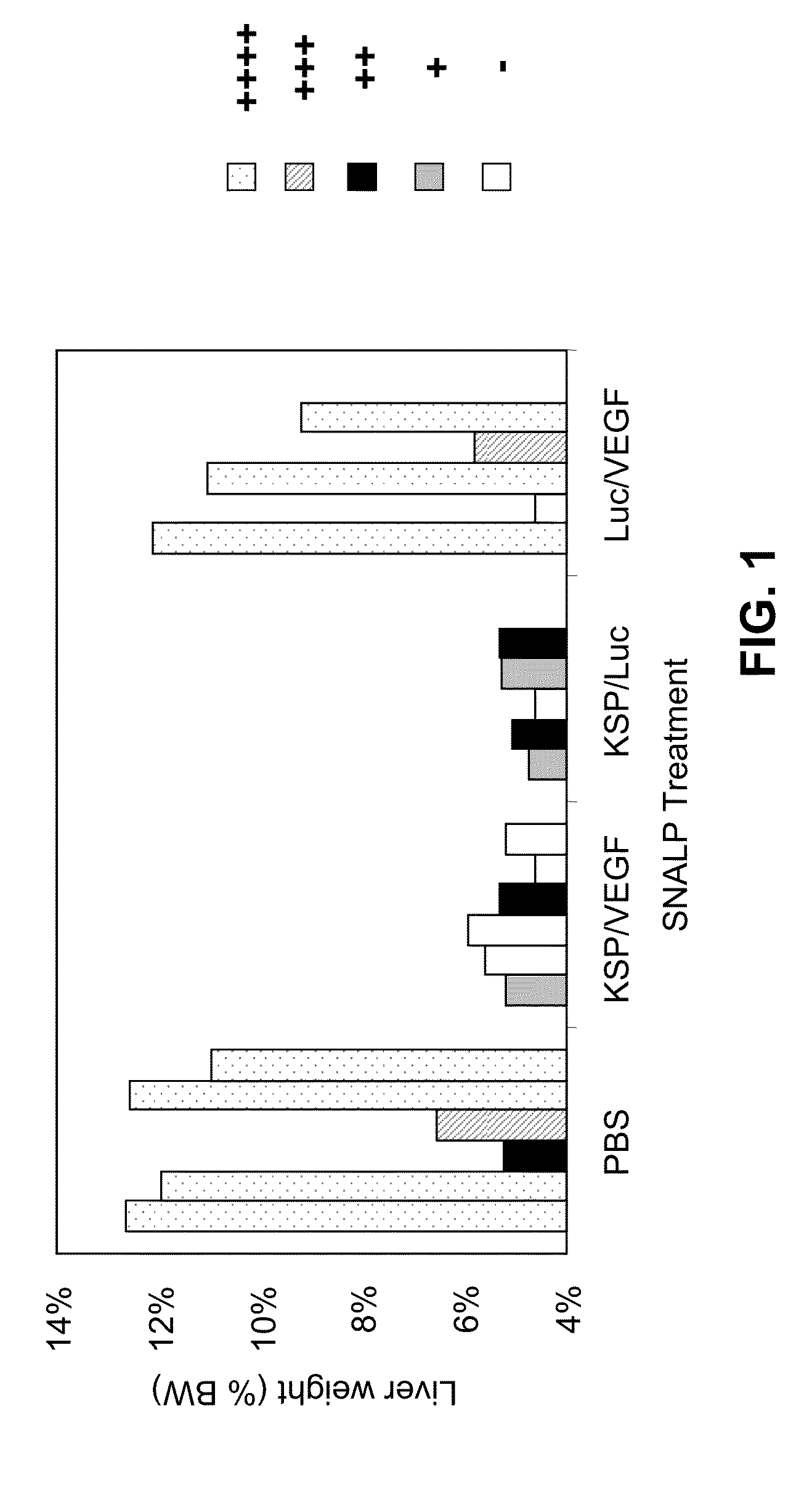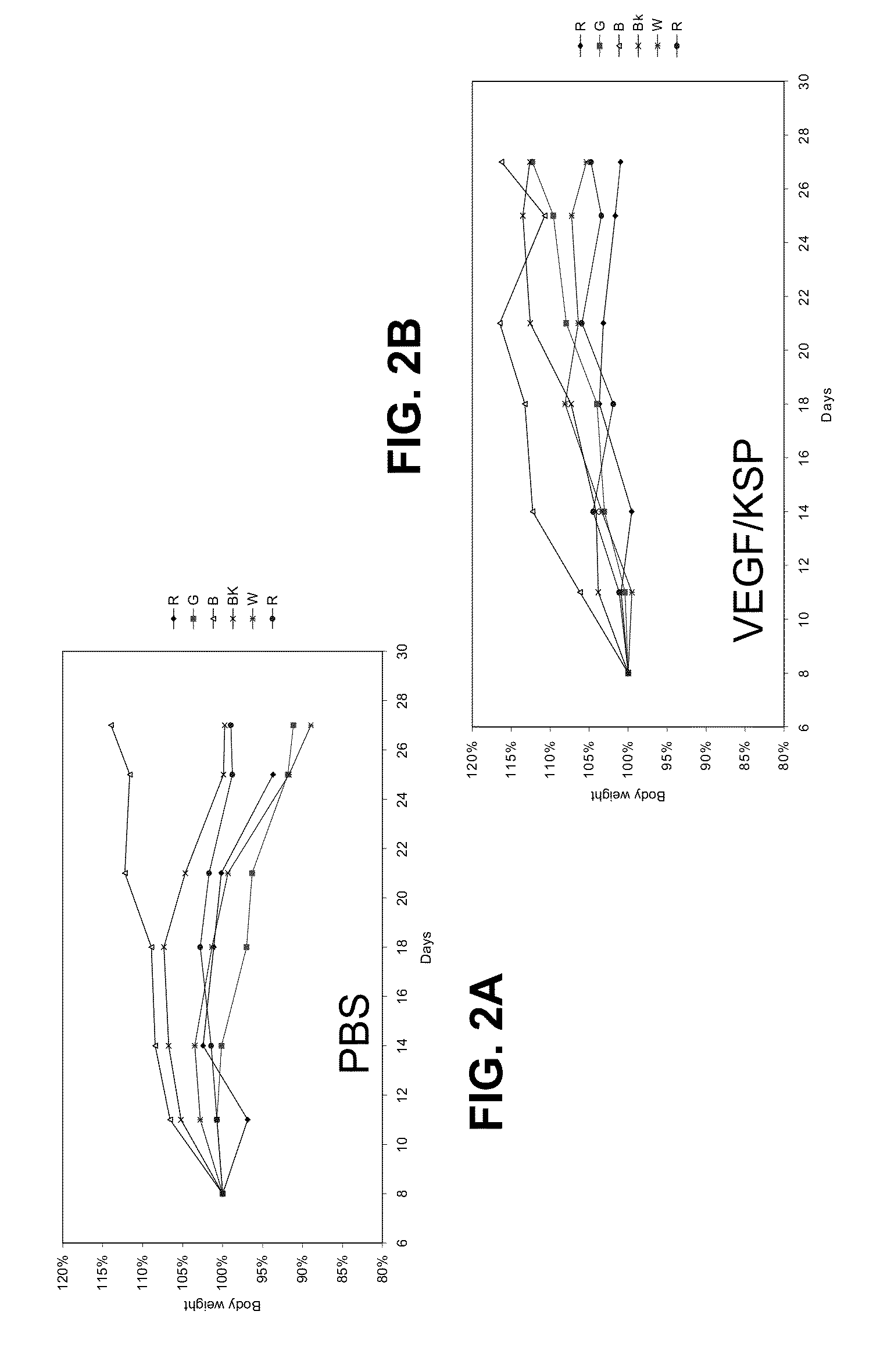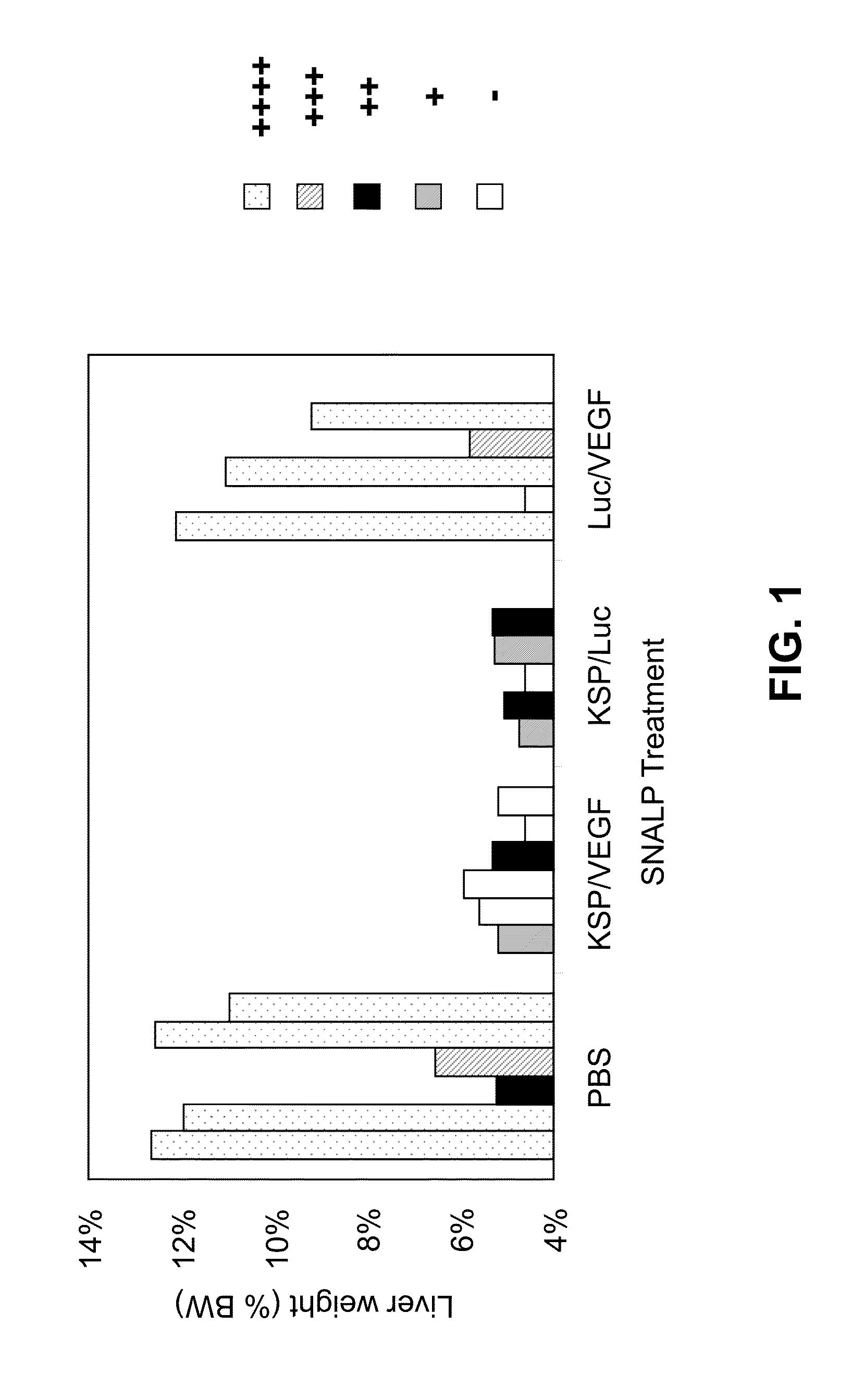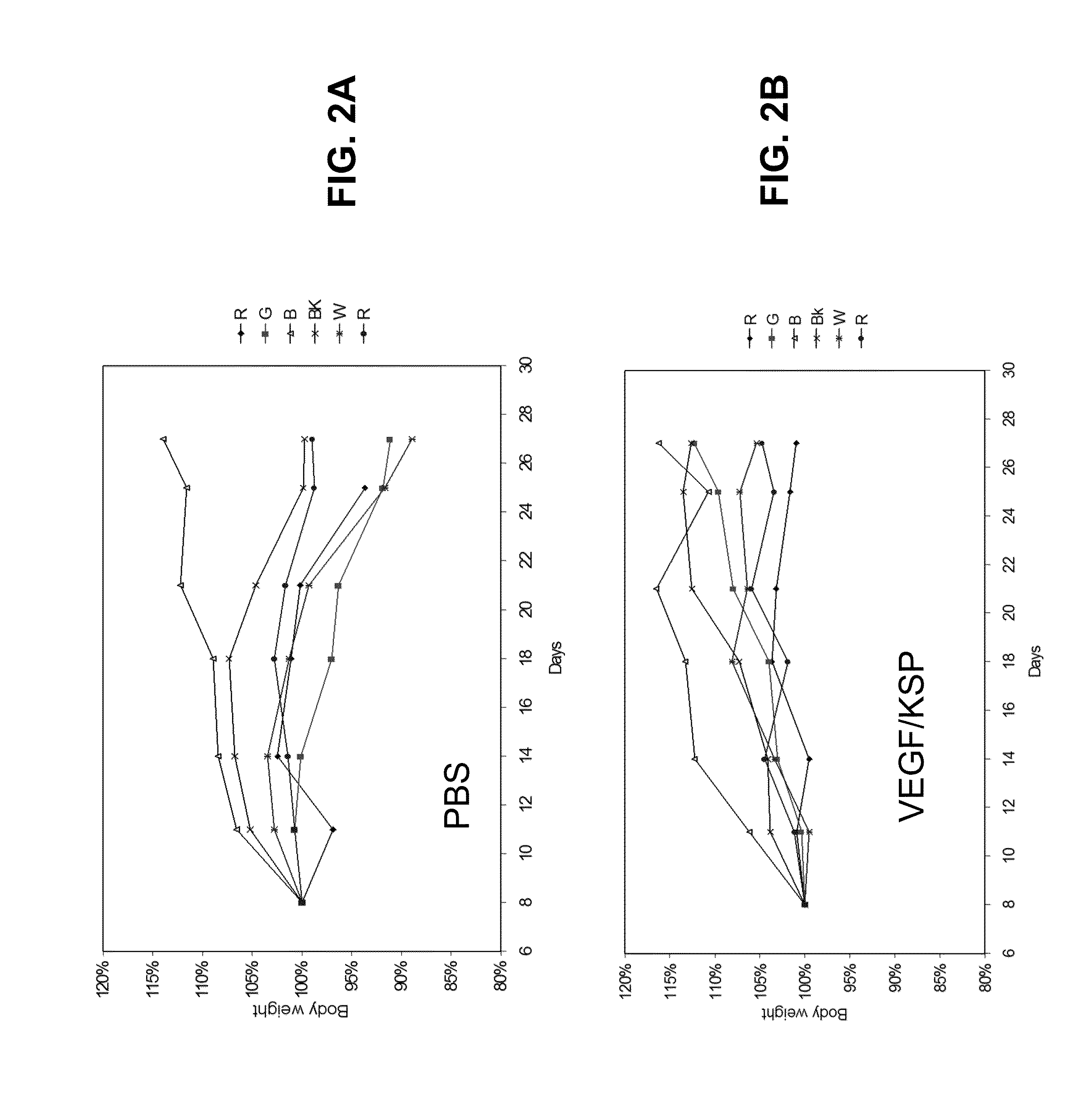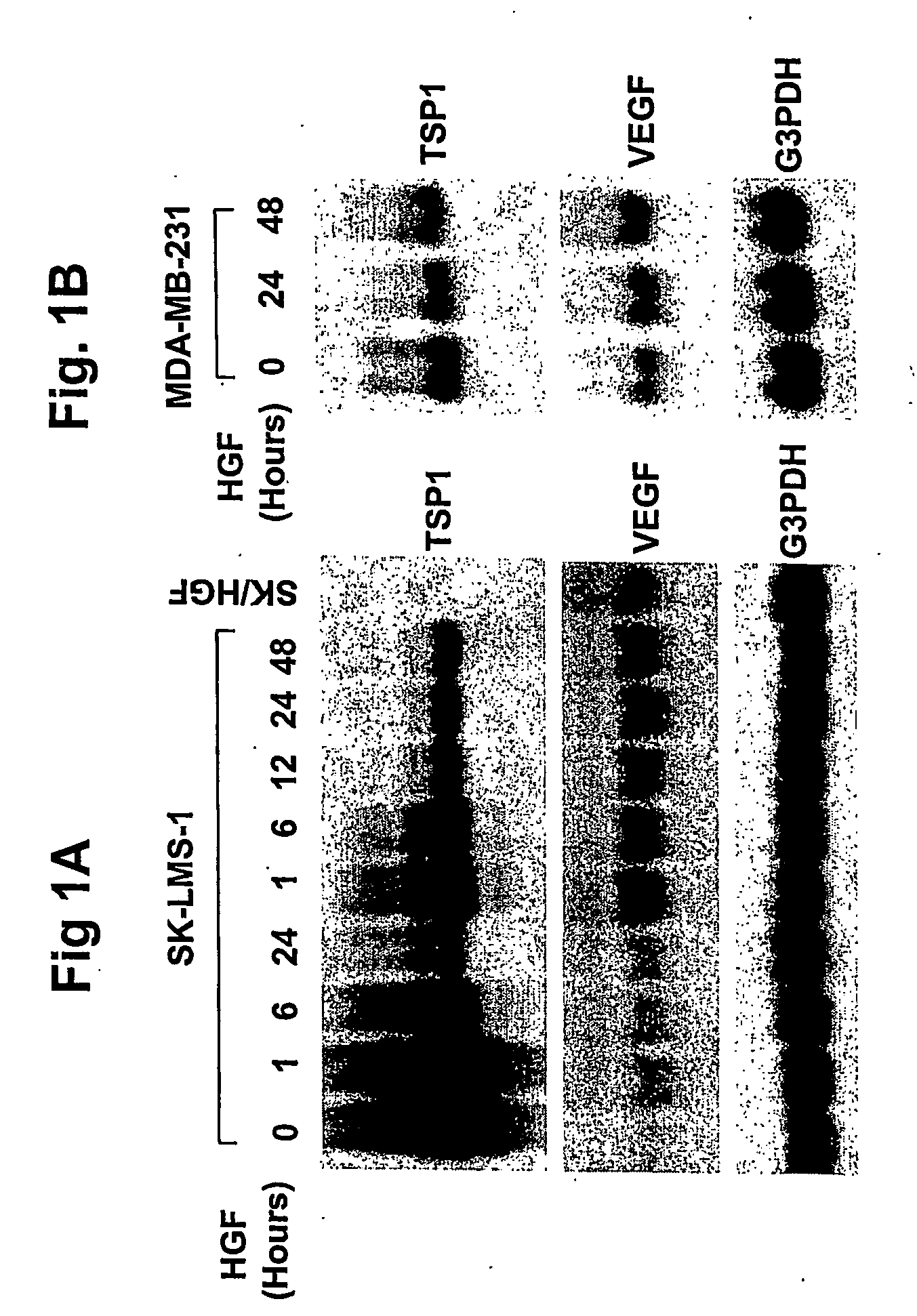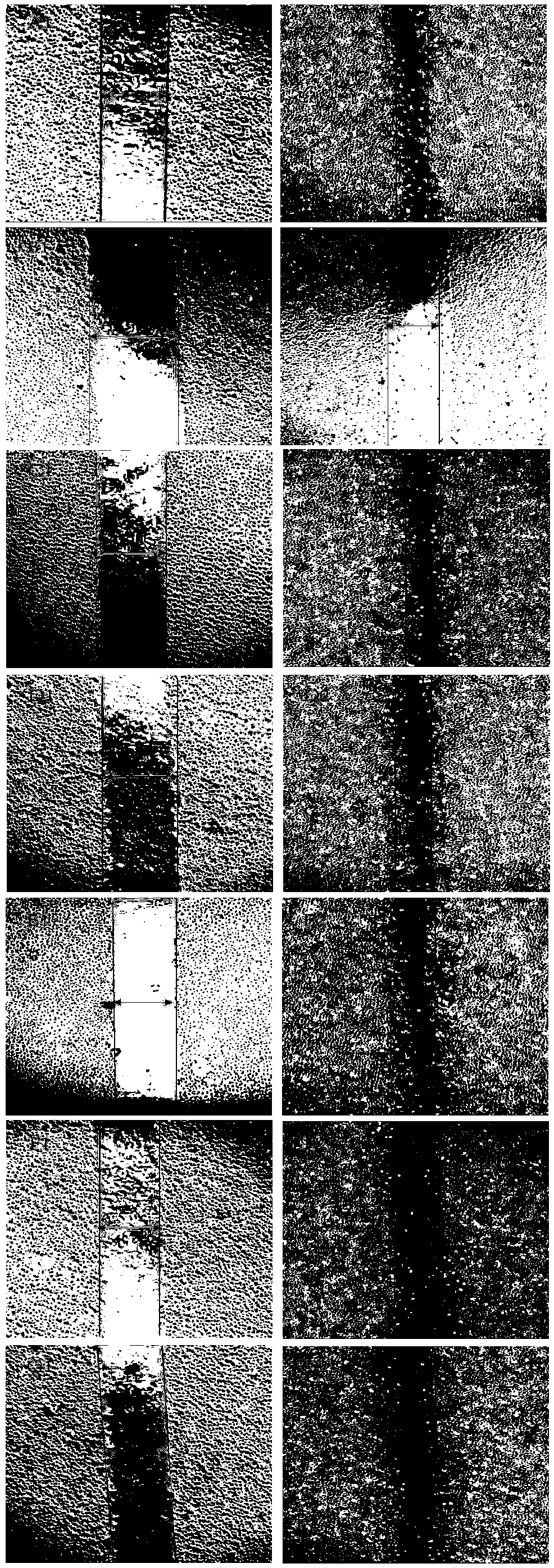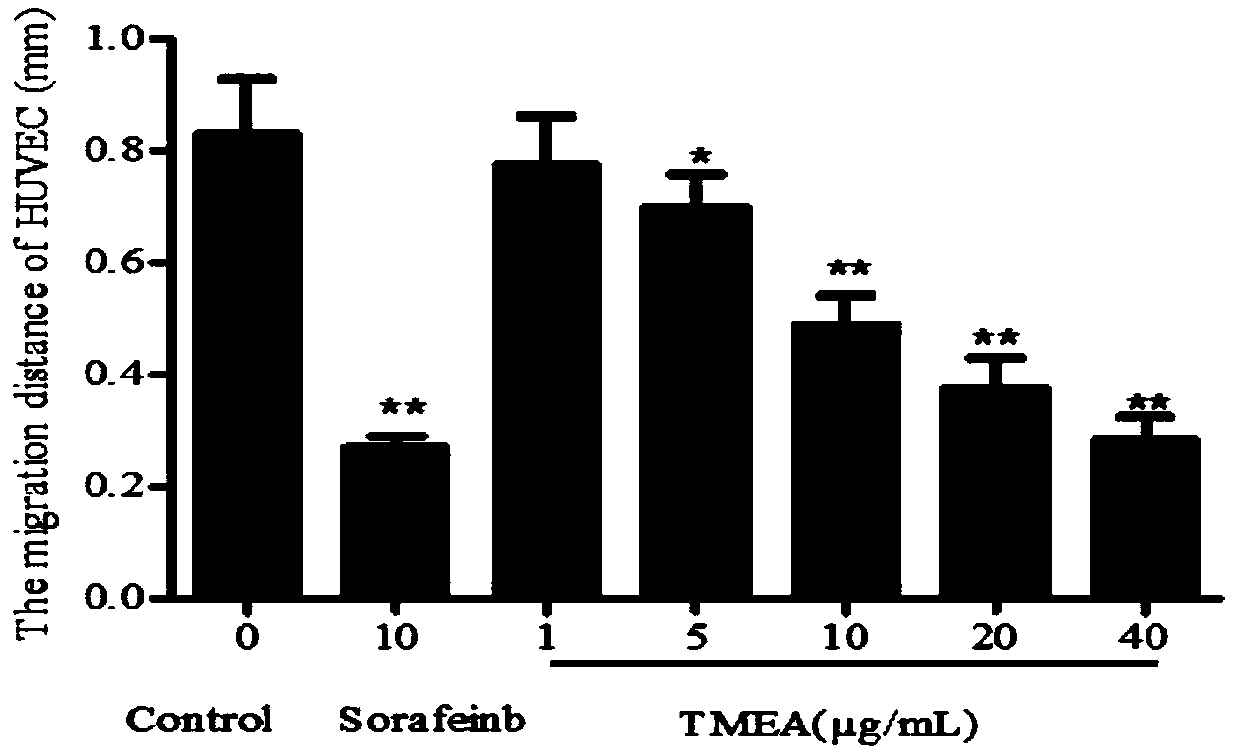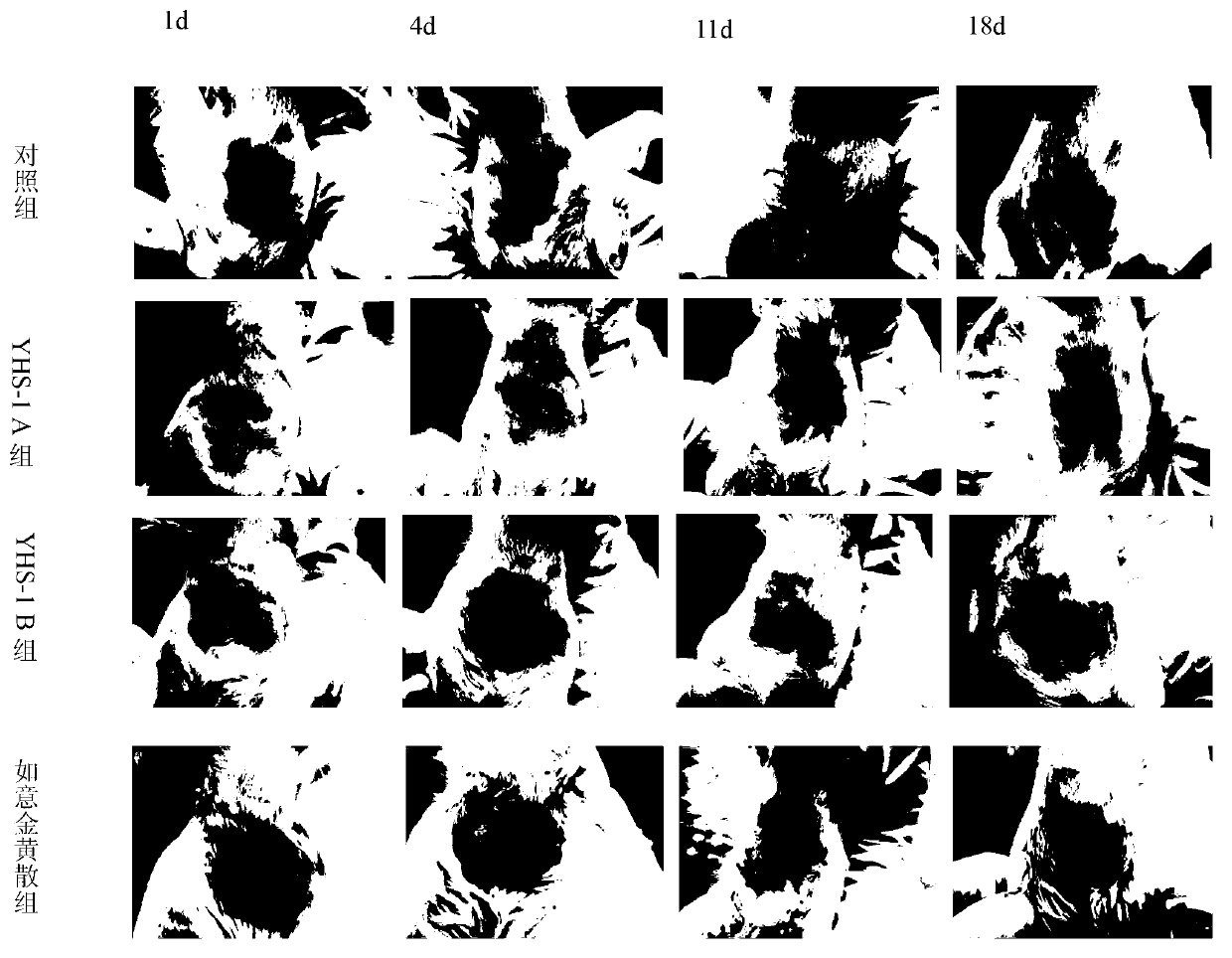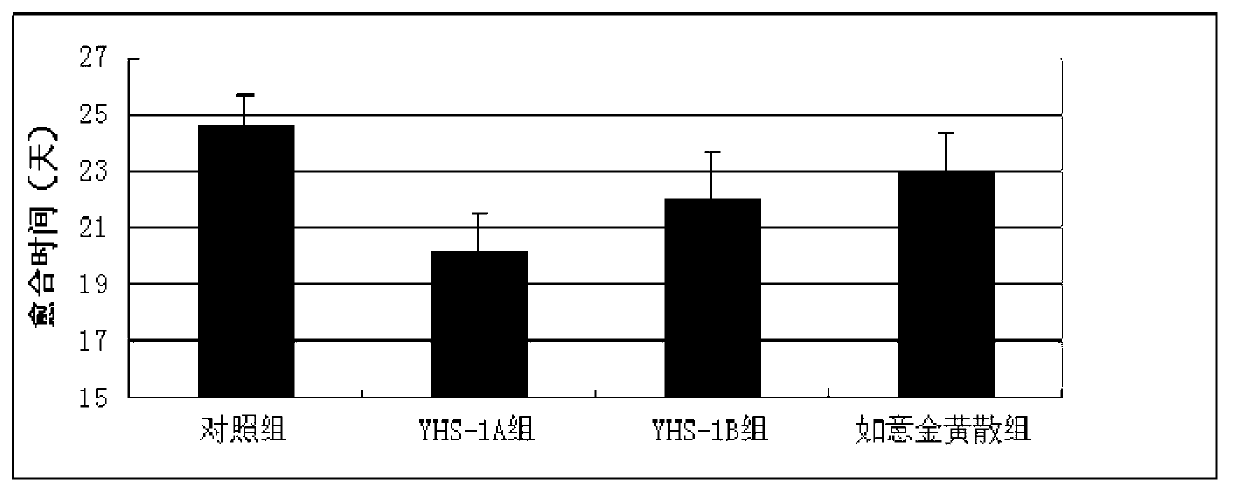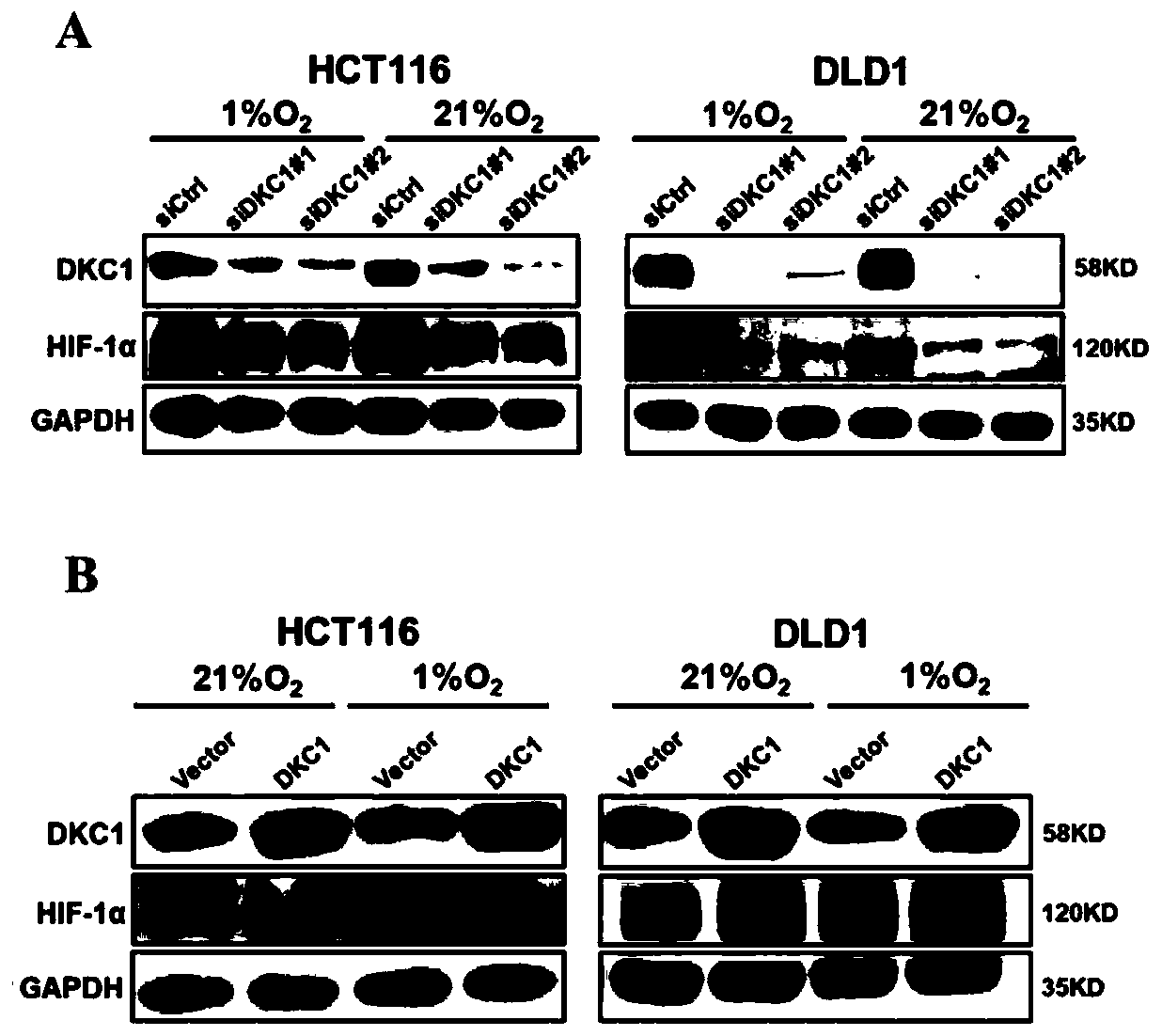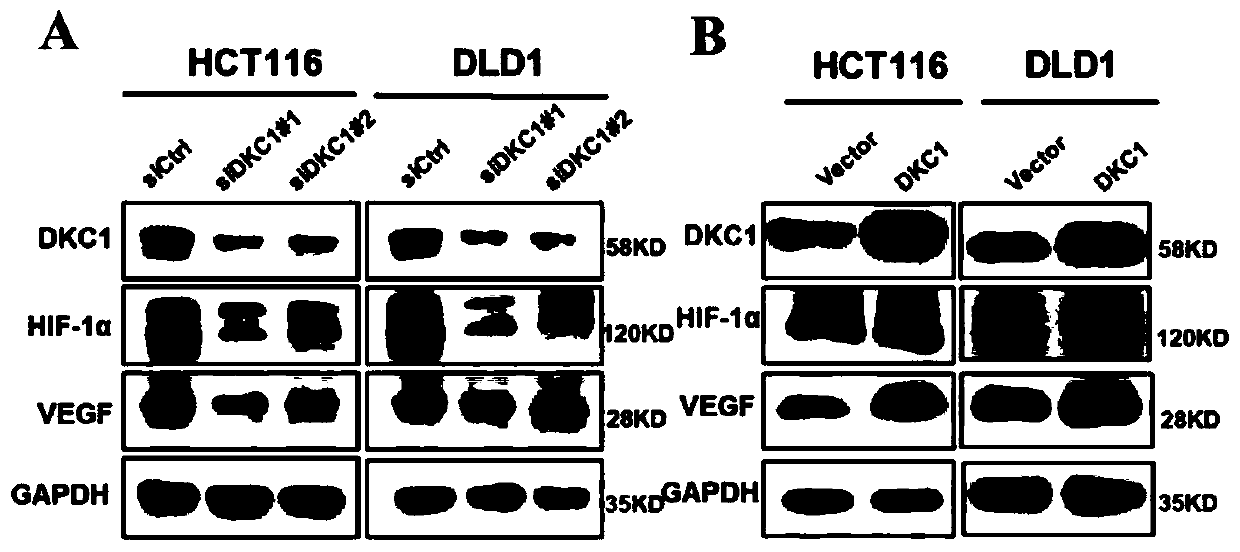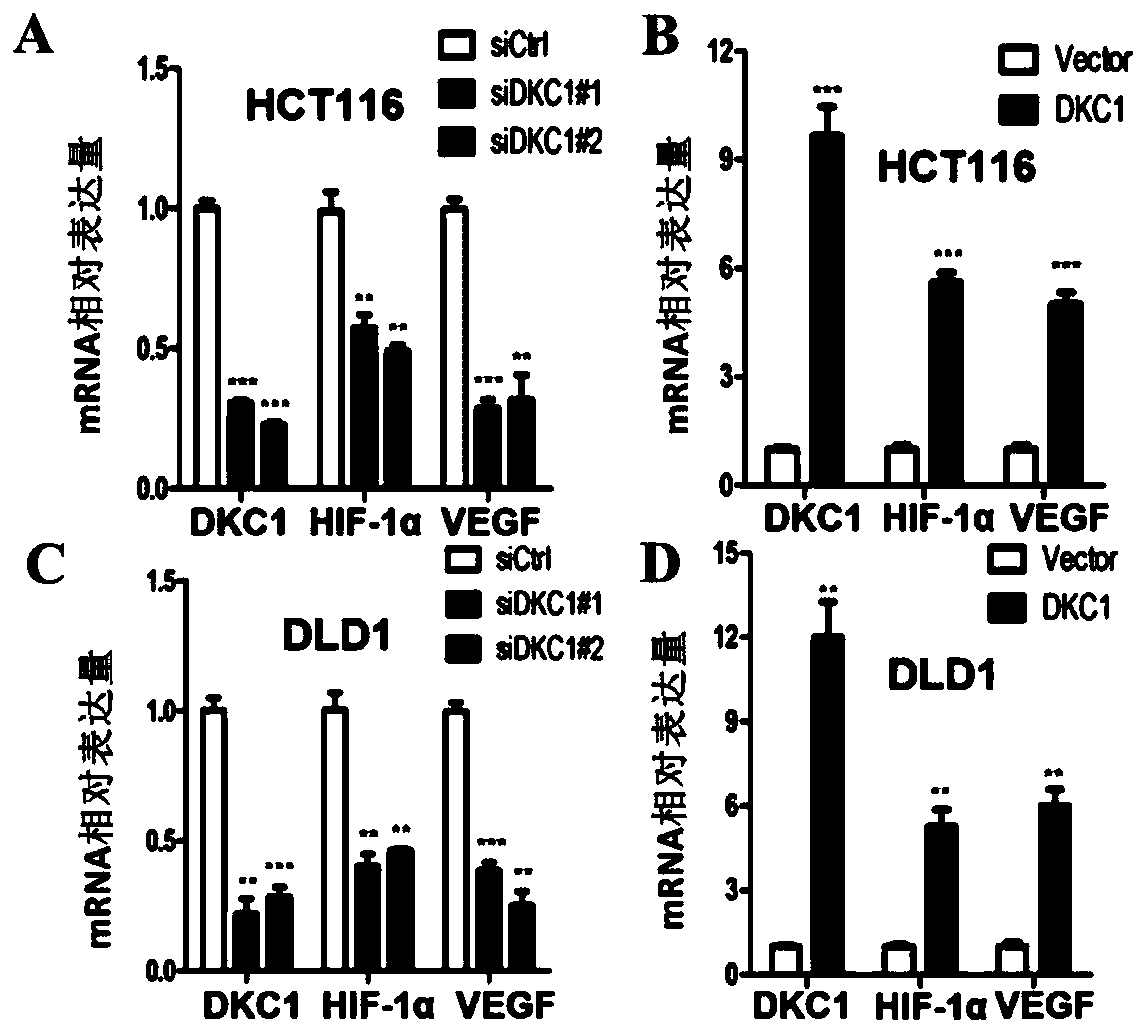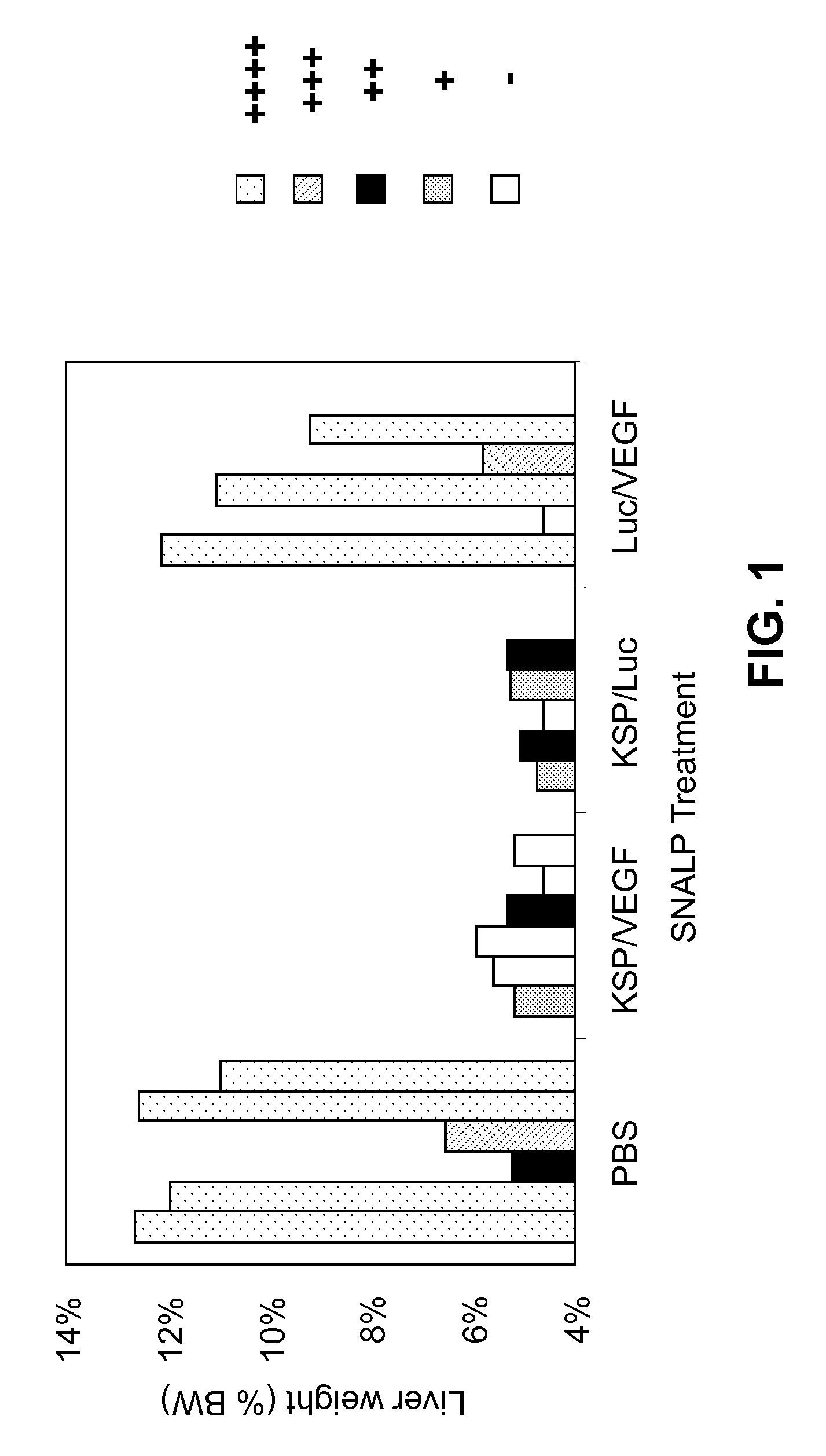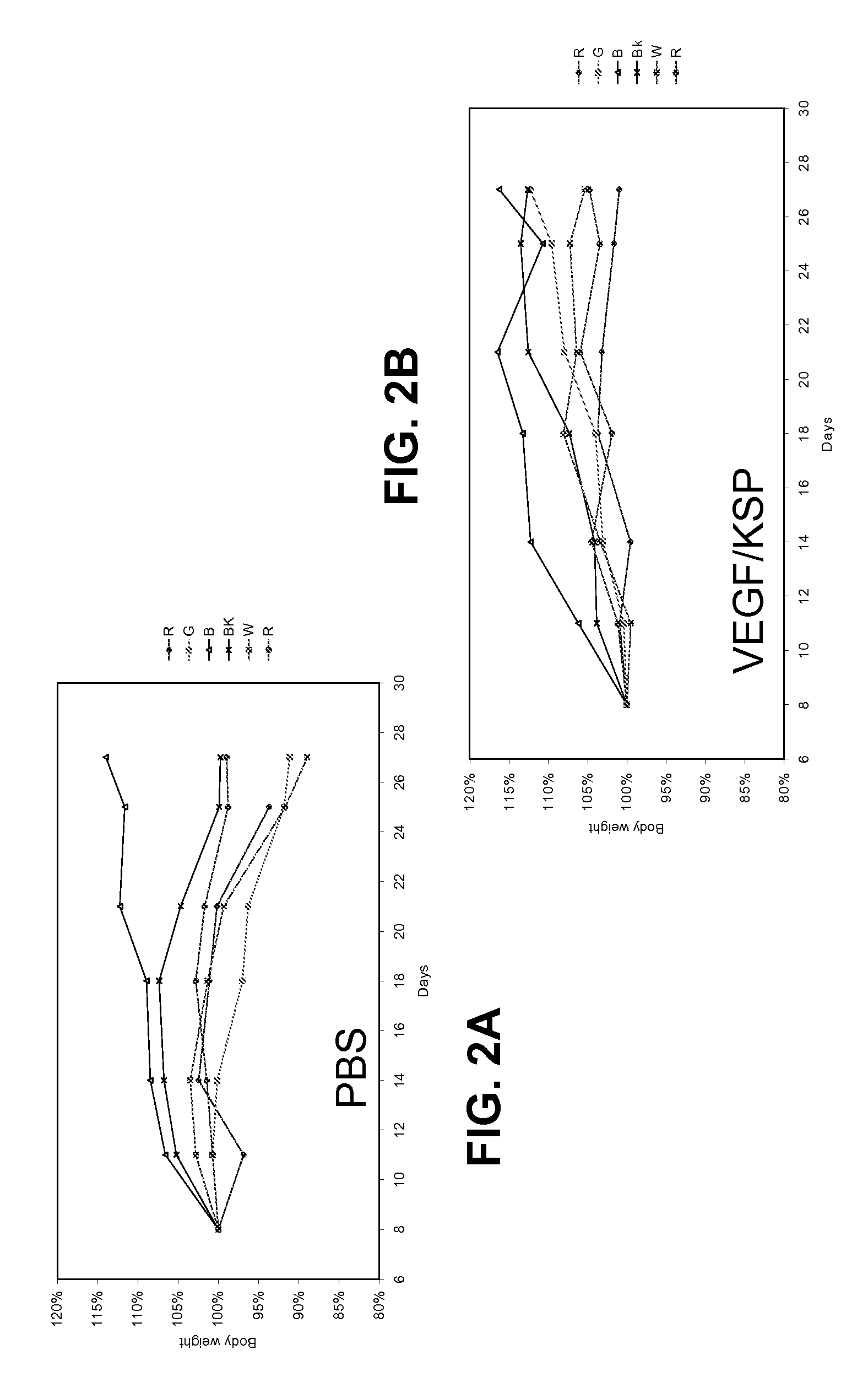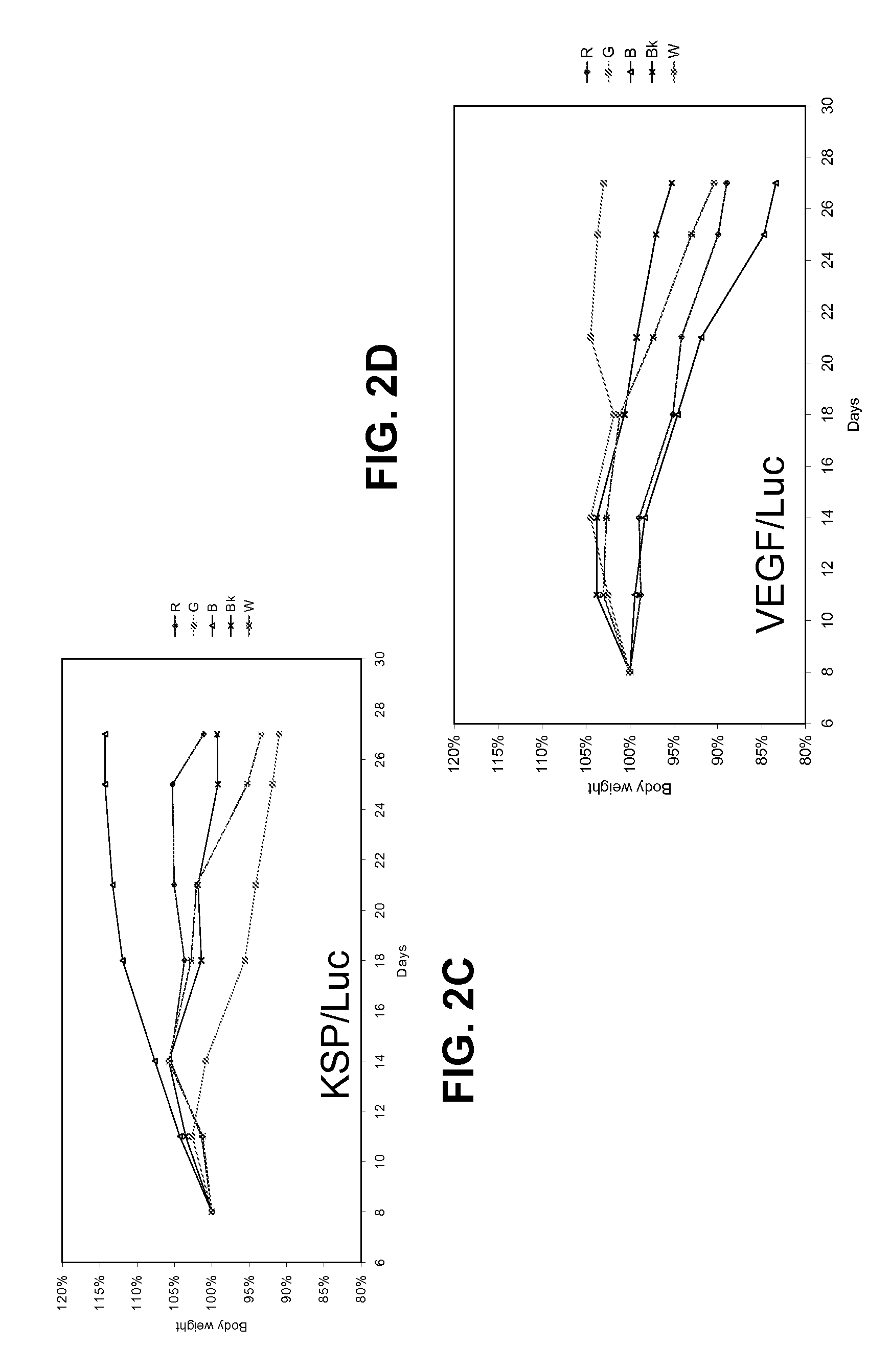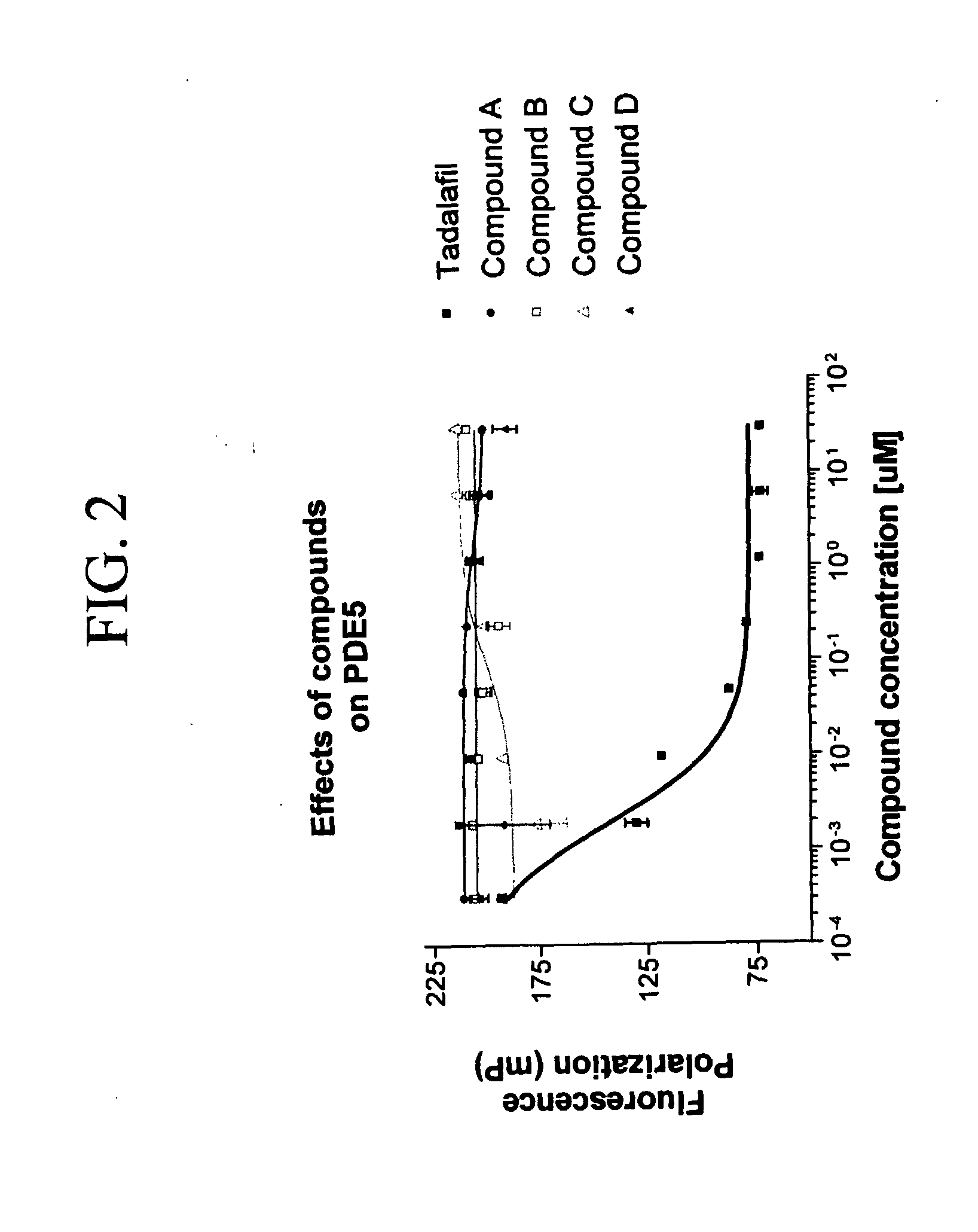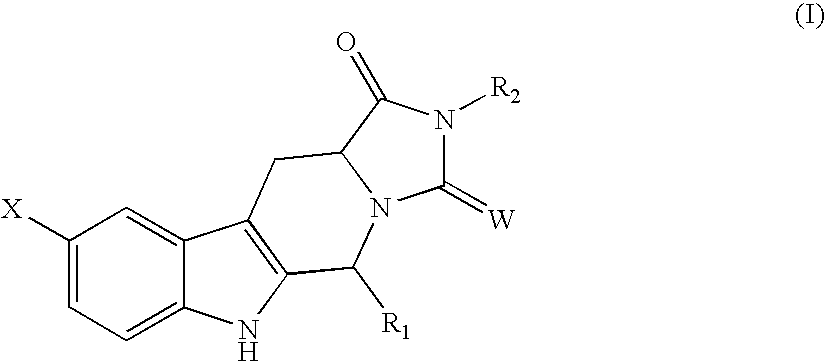Patents
Literature
Hiro is an intelligent assistant for R&D personnel, combined with Patent DNA, to facilitate innovative research.
63 results about "Vegf expression" patented technology
Efficacy Topic
Property
Owner
Technical Advancement
Application Domain
Technology Topic
Technology Field Word
Patent Country/Region
Patent Type
Patent Status
Application Year
Inventor
VEGF is expressed during hypoxia, oxygen suppression, and exercise. However, the mechanism of VEGF expression differs between exercise and hypoxia. A study published in 2010 offers insight into exercise's mechanism of VGEF expression (Exercise-induced VEGF transcriptional activation in brain, lung and skeletal muscle, 2010, Kechun Tang, et al.).
LIPID FORMULATED COMPOSITIONS AND METHODS FOR INHIBITING EXPRESSION OF Eg5 AND VEGF GENES
This invention relates to compositions containing double-stranded ribonucleic acid (dsRNA) in a lipid formulation, and methods of using the compositions to inhibit the expression of the Human kinesin family member 11 (Eg5) and Vascular Endothelial Growth Factor (VEGF), and methods of using the compositions to treat pathological processes mediated by Eg5 and VEGF expression, such as cancer.
Owner:ALNYLAM PHARMA INC
Administration of carboline derivatives useful in the treatment of cancer and other diseases
In accordance with the present invention, compounds that inhibit the expression of VEGF post-transcriptionally have been identified, and compositions, and methods for the administration and use of those compounds. provided. In one aspect of the invention, compounds useful in the inhibition of VEGF production, in the treatment of solid tumor cancer, and in reducing serum, plasma, and / or tumor VEGF levels, are provided. In another aspect of the invention, methods are provided for the inhibition of VEGF production, the treatment of cancer, and the reduction of plasma and / or tumor VEGF levels, using the compounds of the invention.
Owner:PTC THERAPEUTICS INC
Administration of carboline derivatives useful in the treatment of cancer and other diseases
InactiveUS20100158858A1Decreasing VEGF levelSlowing tumorigenesisBiocideSenses disorderDiseaseVegf mrna
Owner:PTC THERAPEUTICS INC
Compositions and Methods for Inhibiting Expression of Eg5 and VEGF Genes
InactiveUS20100087508A1Increase in mono-aster formationInhibit tumor growthOrganic active ingredientsSpecial deliveryVegf expressionDouble stranded
This invention relates to compositions containing double-stranded ribonucleic acid (dsRNA) in a SNALP formulation, and methods of using the compositions to inhibit the expression of the Eg5 and Vascular Endothelial Growth Factor (VEGF), and methods of using the compositions to treat pathological processes mediated by Eg5 and VEGF expression, such as cancer.
Owner:ALNYLAM PHARM INC
Compounds that inhibit HIF-1 activity, the method for preparation thereof and the pharmaceutical composition containing them as an effective component
Disclosed herein are an HIF-1 inhibitor, a method for the preparation thereof, and a pharmaceutical composition comprising the same as an active ingredient. The HIF-1 inhibitor shows anticancer activity thanks to the inhibition activity against HIF-1, a transcription factor which plays an important role in the growth and metastasis of cancer, but not to general cytotoxicity. Thus, the HIF-inhibitor and a pharmaceutically acceptable salt thereof can be used as a therapeutic for various cancers such as liver cancer; stomach cancer and breast cancer. Also, the compound having inhibition activity against HIF-1 is useful in the treatment of diabetic retinopathy and arthritis, which are aggravated by HIF-1-mediated VEGF expression.
Owner:KOREA RES INST OF BIOSCI & BIOTECH
Lipid formulated compositions and methods for inhibiting expression of eg5 and VEGF genes
InactiveUS20130345286A1Effective treatmentOrganic active ingredientsSpecial deliveryVegf expressionDouble stranded
This invention relates to compositions containing double-stranded ribonucleic acid (dsRNA) in a liquid particle formulation, methods of using the compositions to inhibit the expression of the Eg5 / KSP and VEGF, and methods of using the compositions to treat pathological processes mediated by Eg5 / KSP and VEGF expression, such as endometrial cancer.
Owner:ALNYLAM PHARM INC
Carboline derivatives useful in the inhibition of angiogenesis
In accordance with the present invention, compounds that inhibit the expression of VEGF post-transcriptionally have been identified, and methods for their use provided. In one aspect of the invention, compounds useful in the inhibition of VEGF production, in the treatment of solid tumor cancer, and in reducing plasma and / or tumor VEGF levels, are provided. In another aspect of the invention, methods are provided for the inhibition of VEGF production, the treatment of cancer, and the reduction of plasma and / or tumor VEGF levels, using the compounds of the invention.
Owner:PTC THERAPEUTICS INC
Supermicro Tongxinluo Chinese herbal composite and its new usage
ActiveCN1954825AAvoid damageObvious effectPowder deliveryAnthropod material medical ingredientsVascular endotheliumVentricular remodeling
An application of the Chinese medicine 'Superfine Tongxinluo' in relaxing the vascular endothelial injury caused by atherosclerosis, decreasing the cardiac infarction range after AMI reperfusion, preventing hyperlipemia and atherosclerosis, and treating arteria coronaria spasm, pile, thromboangiitis obliterans, platelet coagulation, etc is disclosed.
Owner:HEBEI YILING MEDICINE INST
Detection method for peripheral blood circulating tumor cell VEGF of patient suffering from advanced colorectal carcinoma
InactiveCN105510602AReal-time detectionBiological material analysisBiological testingCell layerFiltration
The invention discloses a detection method for the peripheral blood circulating tumor cell VEGF of a patient suffering from advanced colorectal carcinoma. CTC in peripheral blood of the patient suffering from advanced colorectal carcinoma is obtained by conducting separation through a membrane filtration device; a thin cell layer is manufactured through the cell paraffin block technology; the VEGF gene expression situation of the patient suffering from colorectal carcinoma is detected. By means of the technical method, the VEGF expression situation of the patient where tissue samples can not be obtained can be detected without using colorectal carcinoma tissue. The technology is minimally invasive, and real-time detection can be conducted.
Owner:SHANDONG RES INST OF TUMOUR PREVENTION TREATMENT
Compounds that inhibit hif-1 activity, the method for preparation thereof and the pharmaceutical composition containing them as an effective component
InactiveUS20090306078A1Inhibit expressionInhibit growthBiocideOrganic chemistryDiabetic retinopathyLymphatic Spread
Disclosed herein are an HIF-1 inhibitor, a method for the preparation thereof, and a pharmaceutical composition comprising the same as an active ingredient. The HIF-1 inhibitor shows anticancer activity thanks to the inhibition activity against HIF-1, a transcription factor which plays an important role in the growth and metastasis of cancer, but not to general cytotoxicity. Thus, the HIF-inhibitor and a pharmaceutically acceptable salt thereof can be used as a therapeutic for various cancers such as liver cancer; stomach cancer and breast cancer. Also, the compound having inhibition activity against HIF-1 is useful in the treatment of diabetic retinopathy and arthritis, which are aggravated by HIF-1-mediated VEGF expression.
Owner:KOREA RES INST OF BIOSCI & BIOTECH
Method for serum-free domestication and culture of human mesenchymal stem cells
PendingCN108642002AImprove securityLow costCosmetic preparationsHair cosmeticsSerum freeMesenchymal stem cell
The invention discloses a method for serum-free domestication and culture of human mesenchymal stem cells. According to the method, human placenta-derived mesenchymal stem cells are allowed to adapt to an in-vitro serum-free culture system, and cell density and cell viability similar to the cell density and cell viability of serum culture are obtained; and compared with conventional culture methods for human mesenchymal stem cells, the method provided by the invention is more economical and effective. With the method, the expression levels of bFGF, PDGF and VEGF associated with blood vessel growth are increased compared with undomesticated cells. The domesticated cells can be prepared for preparing stem cell preparations for intravenous injection; and active factor components secreted by the domesticated cells can be used as components of a mask, an eye mask and a hair mask.
Owner:刘馨
Stem cell preparation as well as preparation method and application thereof
InactiveCN105168251ARich sourcesStrong ability to differentiate in vitroPeptide/protein ingredientsSkeletal disorderHigh concentrationTreatment effect
The invention relates to the field of stem cells, and discloses a stem cell preparation as well as a preparation method and an application thereof. The stem cell preparation comprises adipose derived stem cells and is wide in source, high in in-vitro differentiation capacity, high in safety and good in treatment effect. The stem cell preparation also comprises high-concentration platelet-rich plasma, so that the activity of the adipose derived stem cells in the preparation can be improved, and the treatment of the adipose derived stem cells on femoral head necrosis can be promoted. The preparation method is short in preparation time and applicable to the mass production. The stem cell preparation can promote the activity of the bone cells and is favorable for the generation of new bones and capable of enhancing the VEGF expression and enhancing the generation of local necrotic blood vessels, a complete blood vessel net is formed, and the stem cell preparation can be used for preparing a drug for treating the femoral head necrosis.
Owner:GUANGZHOU SALIAI STEMCELL SCI & TECH CO LTD
Application of decidua NK cells and decidua NK cell exosomes from cell subsets in preparing drugs and auxiliary therapeutic agents for treating diseases related to infertility
ActiveCN110721196AIncrease development rateImprove implantation rateCell dissociation methodsMammal material medical ingredientsDiseaseEndometrium thickness
The invention provides application of decidua NK cells and decidua NK cell exosomes from cell subsets in preparing drugs and auxiliary therapeutic agents for treating diseases related to infertility.Experiments prove that the exosomes treat endometrium growth disorders by promoting endometrial thickness increasing, improving endometrial cell activity, reducing endometrial cell damage, promoting VEGF expression, maintaining stem features of endometrium matrix cells and stimulating proliferation, so that the pregnancy success rate of endometrium damage model mice is increased to 50-70% from 20%; and the exosomes treat diseases related to maternal-fetal immunologic tolerance disorders by playing a role of immunologic tolerance, reducing a spontaneous abortion rate and improving a help T lymphocyte level. Besides, the exosomes can effectively increase the developmental rate of zygotes fertilized no matter in vitro or in vivo in a multiple mode, meanwhile, an in-vitro fertilization rate, an implantation rate of implantation and a birth rate are also increased, and positive assisting effects on infertility treatment are achieved.
Owner:PHARCHOICE THERAPEUTICS INC
Aryloxy phenoxy acrylic compound having HIF-1 inhibition activity, method for preparing same, and pharmaceutical composition containing same as an active ingredient
The present invention relates to a compound inhibiting HF-1 activity, a preparation method of the same, and a pharmaceutical composition comprising the same as an active ingredient. The compound of the present invention demonstrates anticancer activity not by non-selective cytotoxicity but by inhibiting the activity of HIF-1, the transcription factor playing an important role in cancer cell growth and metastasis. Accordingly, the compound or the pharmaceutically acceptable salt thereof according to the present invention inhibits HIF-1 activity, and therefore can be used as a therapeutic agent for solid tumors such as colon cancer, liver cancer, stomach cancer and breast cancer. In addition, the compound or the pharmaceutically acceptable salt thereof according to the present invention can be used as an active ingredient for a therapeutic agent for diabetic retinopathy or arthritis which may become worse when hypoxia-induced VEGF expression by HIF-1 increases.
Owner:KOREA RES INST OF BIOSCI & BIOTECH +1
Applications of uterine cavity fluid-derived exosome in preparation of drugs and adjuvant therapeutic agents for treating infertility related diseases
ActiveCN110946878AImprove developmental potentialEasy to makeCell dissociation methodsArtificial cell constructsDiseasePhysiology
The invention relates to the technical field of medicines, and provides applications of uterine cavity fluid-derived exosome in preparation of drugs and adjuvant therapeutic agents for treating infertility related diseases. Through the verification of experiments, exosome realizes the treatment or relieving of endometrial growth disorders by promoting the increasing of the thickness of endometrium, enhancing the activity of endometrial cells, reducing the damages to intimal cells, promoting VEGF expression, maintaining the dryness of endometrial stromal cells and stimulating proliferation; andthrough the realizing of the treating or relieving of maternal-fetal immune tolerance disorder-related diseases by achieving immune tolerance effects, treating spontaneous abortion and enhancing T helper lymphocyte levels, a novel theoretical basis can be provided for infertility treatment. In addition, for both fertilized eggs being fertilized in vivo or fertilized in vitro, the exosome can effectively enhance developmental rates in multiples; and implantation rates and farrowing rates of in vitro fertilization transplantation can be increased as well, so that positive auxiliary effects on infertility treatment can be achieved.
Owner:PHARCHOICE THERAPEUTICS INC
Application of decidua NK cells and cell subsets thereof in preparation of medicines for treating infertility related diseases
ActiveCN110862963AAvoid damageIncreasing the thicknessCell dissociation methodsMammal material medical ingredientsDiseaseEndometrium thickness
The invention provides an application of decidua NK cells and cell subsets thereof in preparation of medicines for treating infertility related diseases. Through experimental verification, according to the decidua NK cell and the cell subset thereof, endometrial growth disorder diseases are treated by promoting endometrial thickness increase, enhancing endometrial cell viability, reducing endometrial cell damage, promoting VEGF expression, maintaining endometrial stromal cell dryness and stimulating proliferation; the pregnancy success rate of endometrial injury model mice is increased from 30% to 60-70%; by exerting the immune tolerance effect, reducing the spontaneous abortion rate and improving the T helper lymphocyte level to treat maternal fetal immune tolerance disorder related diseases, a new way is provided for treatment of infertility.
Owner:PHARCHOICE THERAPEUTICS INC
Combination therapy for diseases involving angiogenesis
A composition useful for treating, preventing, or ameliorating a disease condition involving abnormal angiogenesis comprises at least two therapeutic agents selected from the group consisting of compounds that interact with and inhibit a downstream activity of extracellular VEGF, compounds that interact with at least a VEGF receptor and render it substantially unavailable for interacting with VEGF, and compounds that reduce a level of expression of VEGF. The invention also includes a method for treating, preventing, or ameliorating a disease condition involving abnormal angiogenesis using such a composition.
Owner:BAUSCH & LOMB INC
Adhesion prevention and an endoscopic insufflation system therefor
InactiveUS7073512B2Effective preventionAvoid stickingOrganic active ingredientsInorganic active ingredientsWhite blood cellIsoprostaglandin E1
A method of treating or preventing adhesion formation during or following a surgical procedure comprising administering to a patient in need thereof at least one medicament selected from the group consisting of potassium channels; modulators of macrophage activation and leucocyte attraction through cytokines, or their inhibitors, antibodies or inhibitors blocking the effect of VEGF expression; prostaglandin E1; free radical scavengers, lipid peroxysomes; pregnatrienes; calcium antagonists; hypoxia; acidosis; MP; dopamine; and ATP-MgCl2, wherein the method prevents adhesion formation by preventing anoxemia.
Owner:SATURNUS
Combination Therapy for Diseases Involving Angiogenesis
A composition useful for treating, preventing, or ameliorating a disease condition involving abnormal angiogenesis comprises at least two therapeutic agents selected from the group consisting of compounds that interact with and inhibit a downstream activity of extracellular VEGF, compounds that interact with at least a VEGF receptor and render it substantially unavailable for interacting with VEGF, and compounds that reduce a level of expression of VEGF. The invention also includes a method for treating, preventing, or ameliorating a disease condition involving abnormal angiogenesis using such a composition.
Owner:BAUSCH & LOMB INC
Preparation method, activity and application of GO-PLL-RGDS/VEGF-siRNA targeted gene drug
The invention discloses a delivery system GO-PLL-RGDS / VEGF-siRNA for delivering VEGF-siRNA, discloses a delivery carrier and a preparation method of the delivery system, discloses its nanostructure, discloses the cell uptake of the delivery system, discloses The effect of the delivery system on silencing VEGF gene is disclosed, its efficiency of down-regulating VEGF expression is disclosed, its effect on inhibiting tumor cell proliferation is disclosed, and its effect on inhibiting tumor growth in mice bearing S180 sarcoma and tumor targeting of the delivery system are disclosed effect. Therefore, the application of this gene delivery system in anti-tumor gene therapy drugs is clarified.
Owner:CAPITAL UNIVERSITY OF MEDICAL SCIENCES
Detection method for peripheral blood VEGF of renal cancer patient
The invention discloses a detection method for peripheral blood VEGF of a renal cancer patient. The method comprises the following steps: separating CTC (circulating tumor cell) in the peripheral blood of the advanced renal cancer patient by utilizing a membrane filtering device; producing a thin cell layer by utilizing a cell paraffin block technology, and further detecting the genic expression condition of the VEGF of the renal cancer patient. By virtue of the technological method, the VEFG expression condition of the renal cancer patient can be detected without sampling the renal cancer tissue. The technique is minimally invasive and even noninvasive, and the detection can be performed in real time.
Owner:山东省医学科学院
COMPOSITIONS AND METHODS FOR INHIBITING EXPRESSION OF Eg5 AND VEGF GENES
InactiveUS20130023577A1Inhibit expressionImprove survivalAnimal cellsOrganic active ingredientsVegf expressionDouble stranded
This invention relates to compositions containing double-stranded ribonucleic acid (dsRNA) in a SNALP formulation, and methods of using the compositions to inhibit the expression of the Eg5 and Vascular Endothelial Growth Factor (VEGF), and methods of using the compositions to treat pathological processes mediated by Eg5 and VEGF expression, such as cancer.
Owner:ALNYLAM PHARMA INC
Lipid Formulated Compositions and Methods for Inhibiting Expression of Eg5 And VEGF Genes
This invention relates to compositions containing double-stranded ribonucleic acid (dsRNA) in a lipid formulation, and methods of using the compositions to inhibit the expression of the Human kinesin family member 11 (Eg5) and Vascular Endothelial Growth Factor (VEGF), and methods of using the compositions to treat pathological processes mediated by Eg5 and VEGF expression, such as cancer.
Owner:ALNYLAM PHARMA INC
Inhibition of tumor angiogenesis by combination of thrombospondin-1 and inhibitors of vascular endothelial growth factor
InactiveUS20070020234A1Prevent and inhibitSuppression problemOrganic active ingredientsPeptide/protein ingredientsEctopic expressionAgonist peptide
Hepatocyte growth factor / scatter factor (HGF / SF), acting through the Met receptor, plays an important role in most human solid tumors and inappropriate expression of this ligand-receptor pair is often associated with poor prognosis. The molecular basis for the malignant activity imparted by signaling of HGF / SF-Met in cancer cells has been attributed to its mitogenic and invasive properties. However, HGF / SF also induces angiogenesis, but the signaling mechanism has not been understood, nor has this activity been directly associated with HGF / SF-Met mediated tumorigenesis. HGF / SF induces expression in vitro of VEGF, a key agonist of tumor angiogenesis. By contrast, thrombospondin-1 (TSP-1) is a negative regulator of angiogenesis. This application discloses that, in the very same tumor cells, in addition to inducing VEGF expression, HGF / SF dramatically down regulates TSP-1 expression. TSP shut off plays an important, extrinsic role in HGF / SF-mediated tumor development, as ectopic expression of TSP-1 markedly inhibited tumor formation through the suppression of angiogenesis. While VEGF induced expression is sensitive to inhibitors of several pathways, including MAP kinase, PI3 kinase and Stat3, TSP-1 shut off by HGF / SF is prevented solely by inhibiting MAP kinase activation. Thus HGF / SF is a “switch” for turning on angiogenesis. TSP-1 is a useful antagonist to tumor angiogenesis, and therefore TSP-1 and agonist peptides and mimics, as well as inducers of TSP-1, have therapeutic value when used in conjunction with inhibitors of VEGF.
Owner:VAN ANDEL RES INST
Application of active component of sanguisorba officinalis to preparation of antitumor medicines
InactiveCN108714149AEnhanced inhibitory effectObvious time-concentration effectOrganic active ingredientsAntineoplastic agentsCytotoxicityTherapeutic effect
The invention belongs to the field of medicines, particularly discloses application of an active component 3,3',4'-trimethoxy ellagic acid of sanguisorba officinalis to preparation of antitumor medicines, and discloses the 3,3',4'-trimethoxy ellagic acid. The 3,3',4'-trimethoxy ellagic acid inhibits angiogenesis through down-regulation of VEGF expression and inhibition of phosphorylation of PI3K / AKT / mTOR, induces tumor cell apoptosis through activation of a Bax / Bcl-2 / Caspase-3 pathway, has a dual-effect antitumor effect of inhibiting tumor angiogenesis and cytotoxicity, and has a good therapeutic effect during application to preparation of anticancer medicinal preparations.
Owner:SOUTHWEST MEDICAL UNIVERISTY
Method for preparing recombinant vEGF using domestic silkworm as biological factory
InactiveCN1594566AQuick extractionSolve operational problemsFermentationPlant genotype modificationEscherichia coliHigh level expression
The invention discloses a method for producing recombinant blood vessel endothelial cell growth factor VEGF by employing domestic silkworm as bio-factory. The invention uses baculovirus HyNPV hybridized by AcNPV and BmNPV as vector, constructs recombinant virus containing human VEGF gene, expresses highly recombinant human VEGF with biological activity while using domestic silkworm as baculoviral host, solves the shortcomings that it needs complicated operations in VEGF expression in escherichia coli, that plasmid transformer is not stable in yeast expression, and that the cost is high in mammal cell expression. recombinant human VEGFs expressed by domestic silkworm lava are mainly secreted into haemolymph, which favors the rapid protein extraction. Results shows that its is safe and practical that domestic silkworm is used as bio-factory and recombinant baculovirus as vector. Recombinant VEGF can be scale produced, which opens broad prospect in medical and therapeutical fields.
Owner:ZHEJIANG UNIV
Traditional Chinese medicine composition for preventing and treating chemotherapeutic extravasation injury and preparation method and application thereof
InactiveCN103083519APromote hyperplasiaPromote repairHydroxy compound active ingredientsCardiovascular disorderPollenVegf expression
The invention provides a traditional Chinese medicine composition for preventing and treating chemotherapeutic extravasation injury and a preparation method thereof. The traditional Chinese medicine composition is prepared from the following components in parts by weight of 10-50 parts of corydalis tuber, 10-50 parts of pollen typhae, 10-60 parts of oriental arborvitae carbon, 10-50 parts of rheum officinale, 5-15 parts of borneol, 5-20 parts of paris polyphylla, and 5-30 parts of ferula asafetida. The traditional Chinese medicine composition is prepared in crushing and mixing manners; the expression of ICAM-1 (intercellular adhesion molecule) in affected vein and surrounding tissue is reduced by the traditional Chinese medicine composition; local inflammatory response is reduced; meanwhile, the expression of endothelial cell VEGF (vascular endothelial growth factor) in the affected vein is regulated upwards; proliferation and repair of vascular endothelial cell are facilitated; healing of inflammation is facilitated; and necrotizing phlebitis caused by strongly stimulated chemotherapy drugs exosmosis can be treated instead of a surgical method, so as to achieve the healing effect. The traditional Chinese medicine composition is simple in preparation method and suitable for the requirements of large-scale industrial production.
Owner:冯莉霞 +1
Application of DKC1 and HIF-1 alpha in the synergistic treatment of colorectal cancer
PendingCN110305962AInhibit migrationPrevent invasionMicrobiological testing/measurementAntineoplastic agentsVEGF Signaling PathwayAngiogenesis growth factor
The invention discloses an application of DKC1 and of HIF-1 alpha in a synergistic treatment of a colorectal cancer. According to the application of DKC1 and of HIF-1 alpha in the synergistic treatment of the colorectal cancer, an experiment shows that the expression of HIF-1 alpha and VEGF is in positive correlation with the expression of the DKC1. The DKC1 inhibits angiogenesis by adjusting an HIF-1 alpha / VEGF signal path and further inhibits tumor migration and invasion, thus the DKC1, the HIF-1 alpha, and the VEGF can all become drug targets for the treatment of the colorectal cancer, theDKC1 and the HIF-1 alpha / VEGF can be simultaneously suppressed, and the synergistic interaction effect is produced for the treatment of the colorectal cancer.
Owner:XUZHOU MEDICAL UNIV
Lipid formulated compositions and methods for inhibiting expression of Eg5 and VEGF genes
This invention relates to compositions containing double-stranded ribonucleic acid (dsRNA) in a liquid particle formulation, methods of using the compositions to inhibit the expression of the Eg5 / KSP and VEGF, and methods of using the compositions to treat pathological processes mediated by Eg5 / KSP and VEGF expression, such as endometrial cancer.
Owner:ALNYLAM PHARMA INC
Tetra-Cyclic Carboline Derivatives Useful in the Inhibition of Angiogenesis
In accordance with the present invention, tetracyclic caboline derivatives that inhibit the expression of VEGF post-transcriptionally have been identified, and methods for their use provided. In one aspect of the invention, these compounds useful in the inhibition of VEGF production, in the inhibition of angiogenesis, and / or in the treatment of cancer, diabetic retinopathy or exudative macular degeneration are provided. In another aspect of the invention, methods are provided for the inhibition of VEGF production, the inhibition of angiogenesis, and / or the treatment of cancer, diabetic retinopathy or exudative macular degeneration using the compounds of the invention.
Owner:PTC THERAPEUTICS INC
Popular searches
Features
- R&D
- Intellectual Property
- Life Sciences
- Materials
- Tech Scout
Why Patsnap Eureka
- Unparalleled Data Quality
- Higher Quality Content
- 60% Fewer Hallucinations
Social media
Patsnap Eureka Blog
Learn More Browse by: Latest US Patents, China's latest patents, Technical Efficacy Thesaurus, Application Domain, Technology Topic, Popular Technical Reports.
© 2025 PatSnap. All rights reserved.Legal|Privacy policy|Modern Slavery Act Transparency Statement|Sitemap|About US| Contact US: help@patsnap.com


